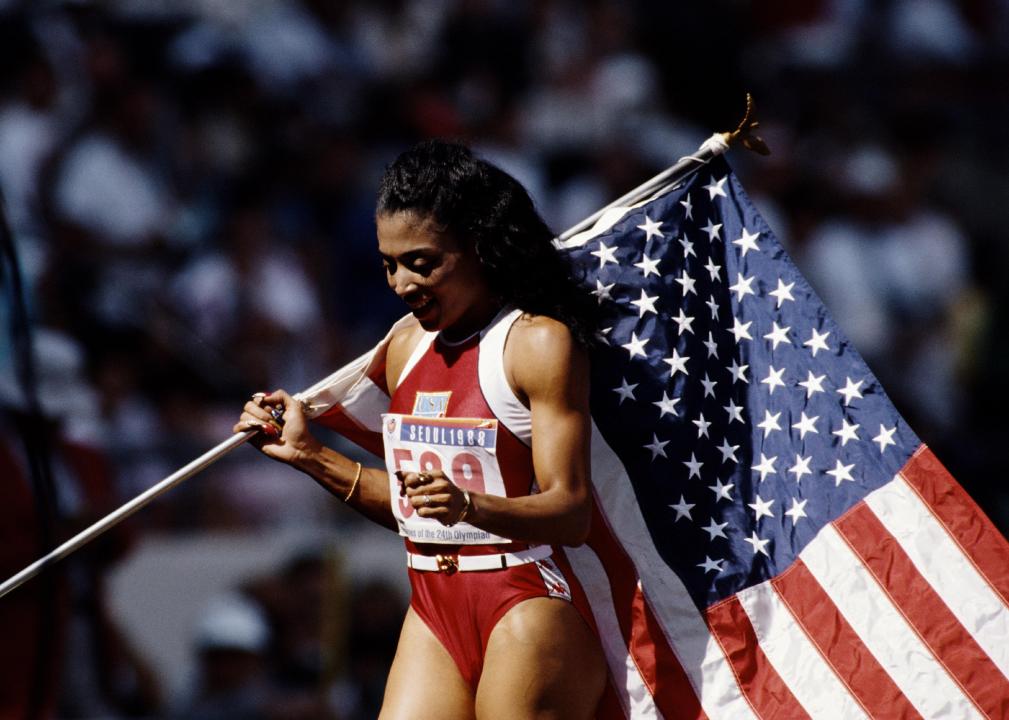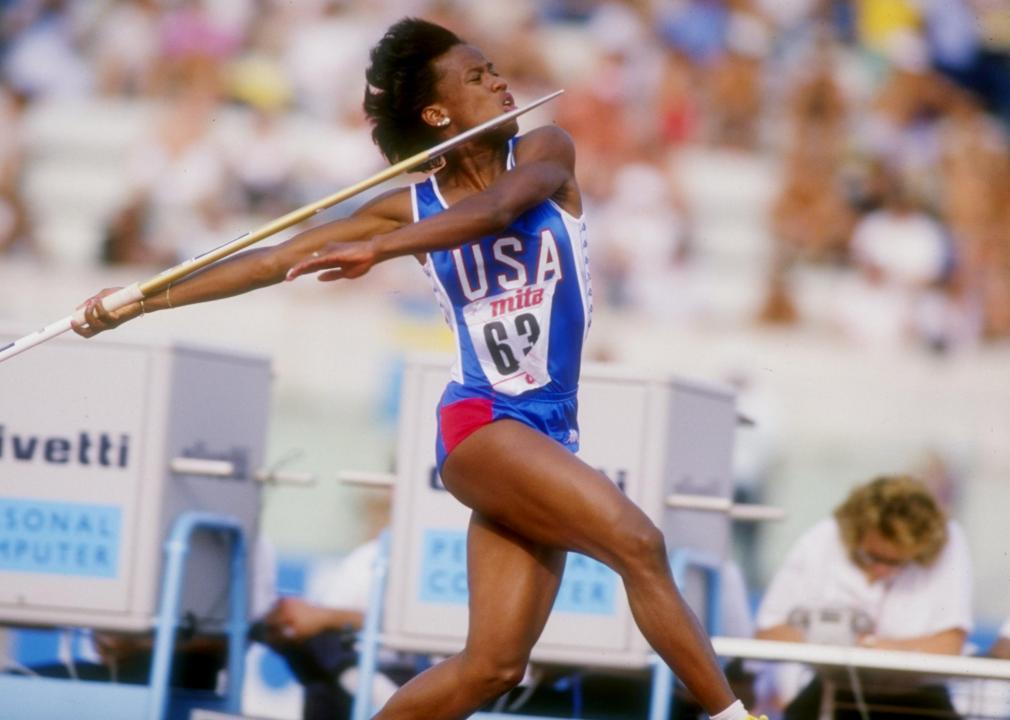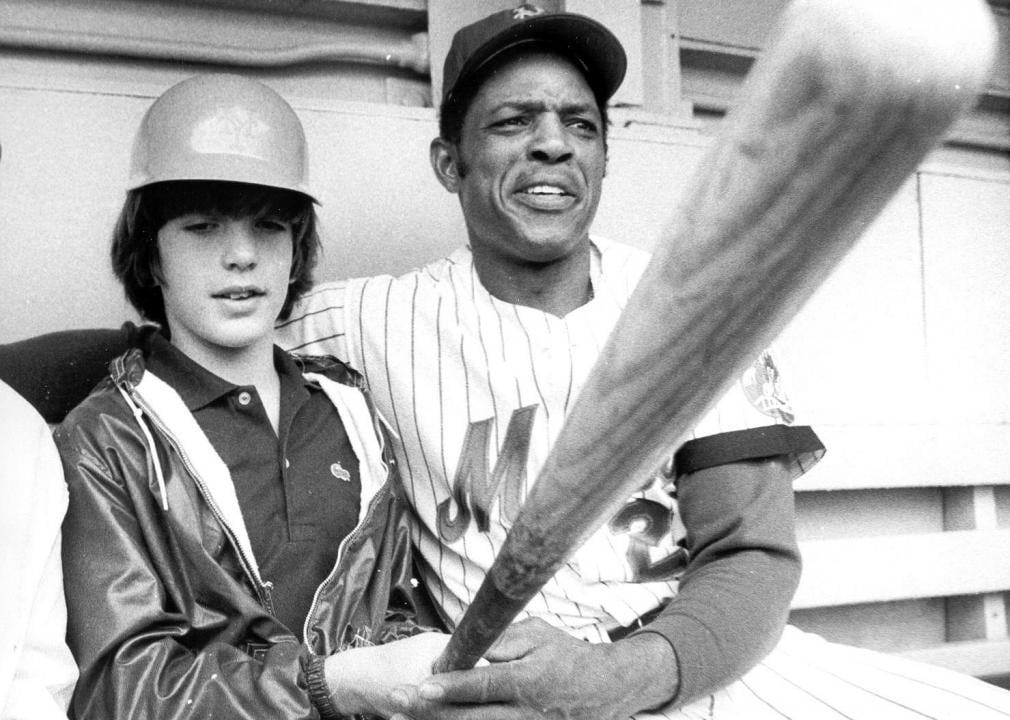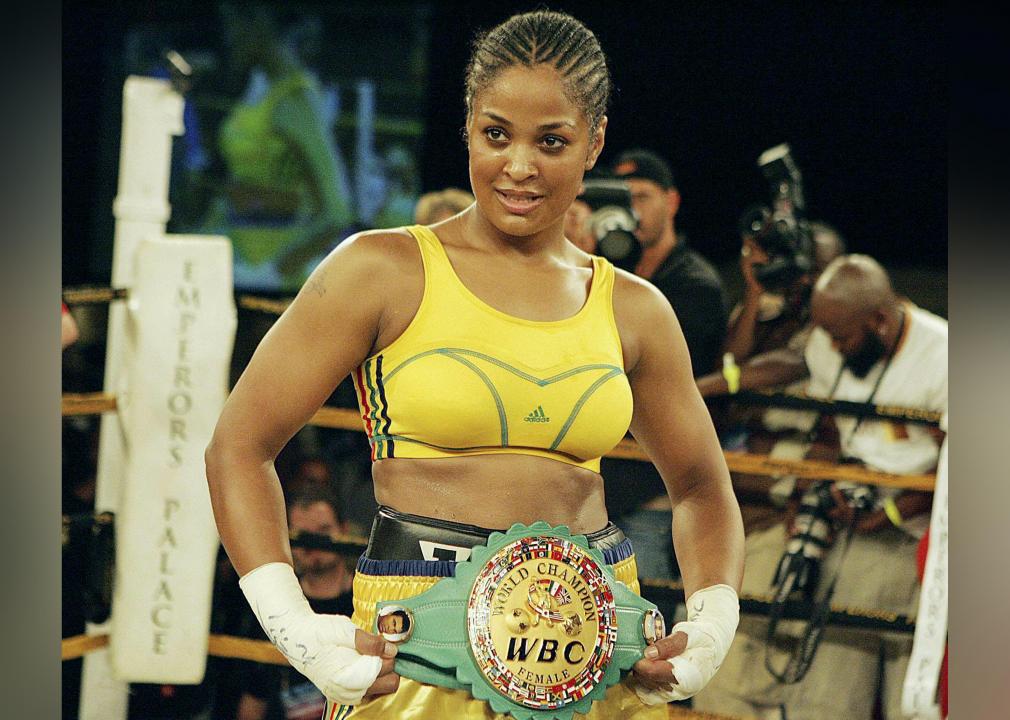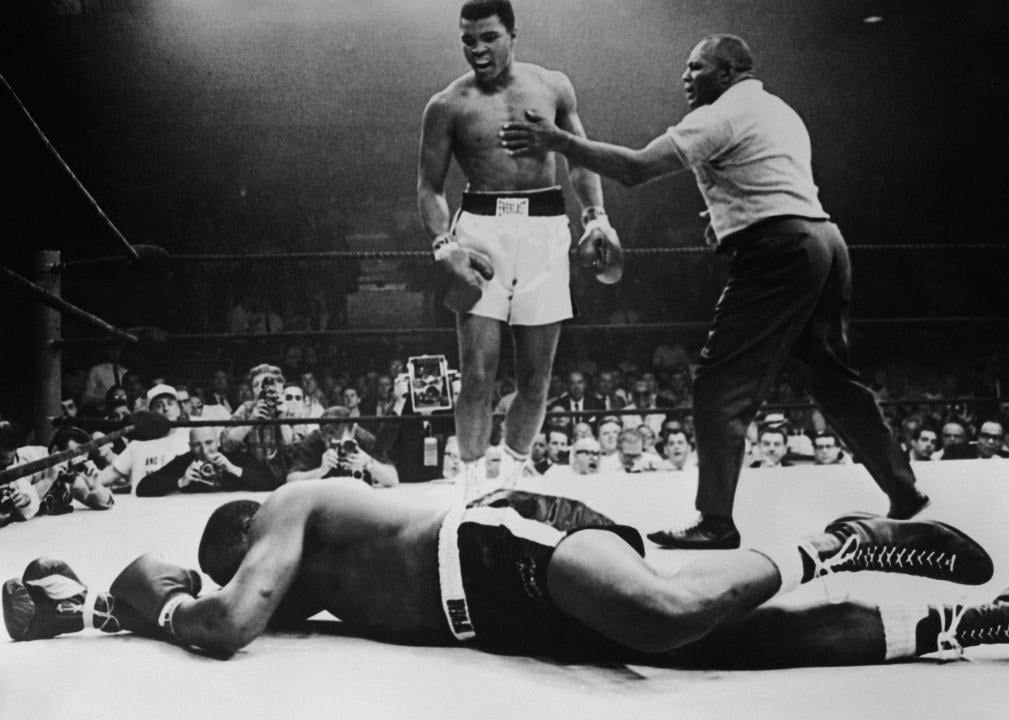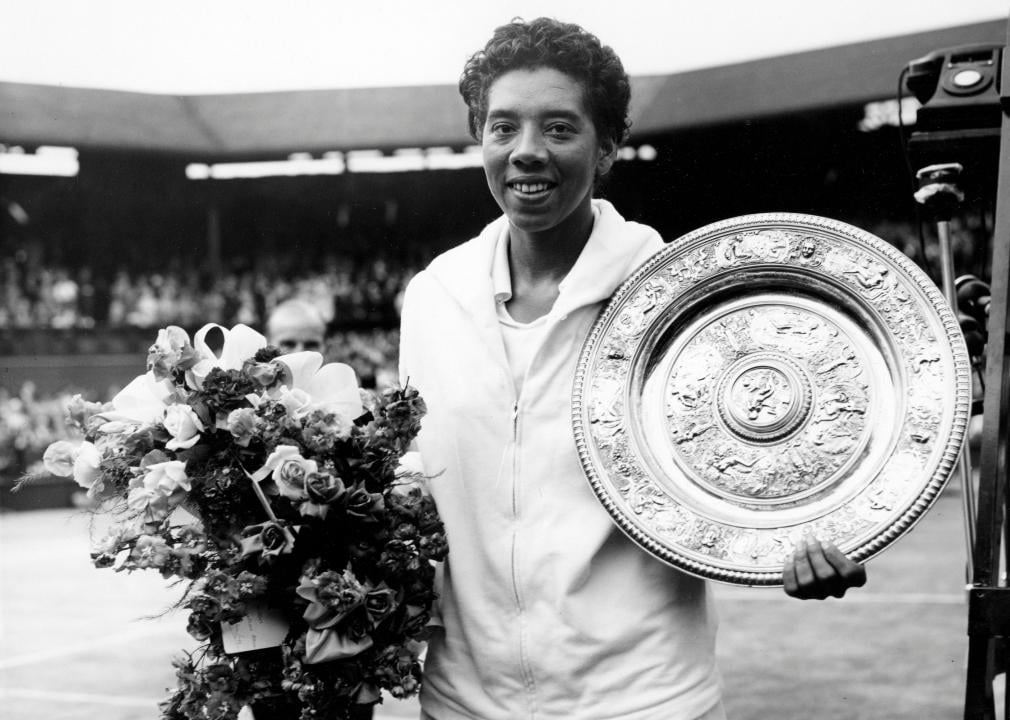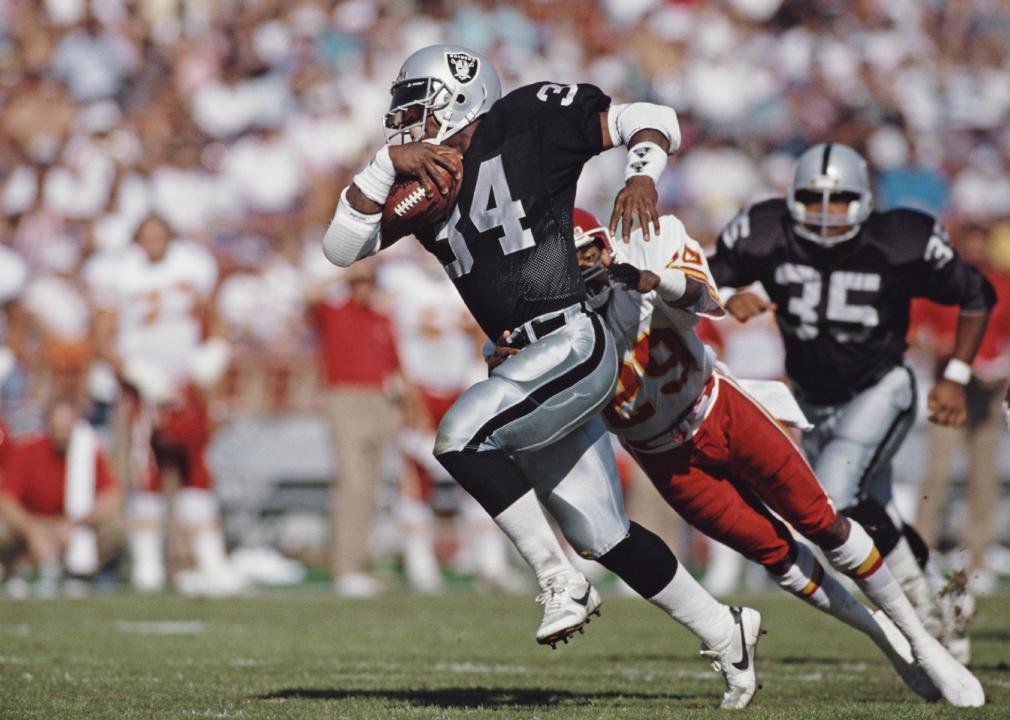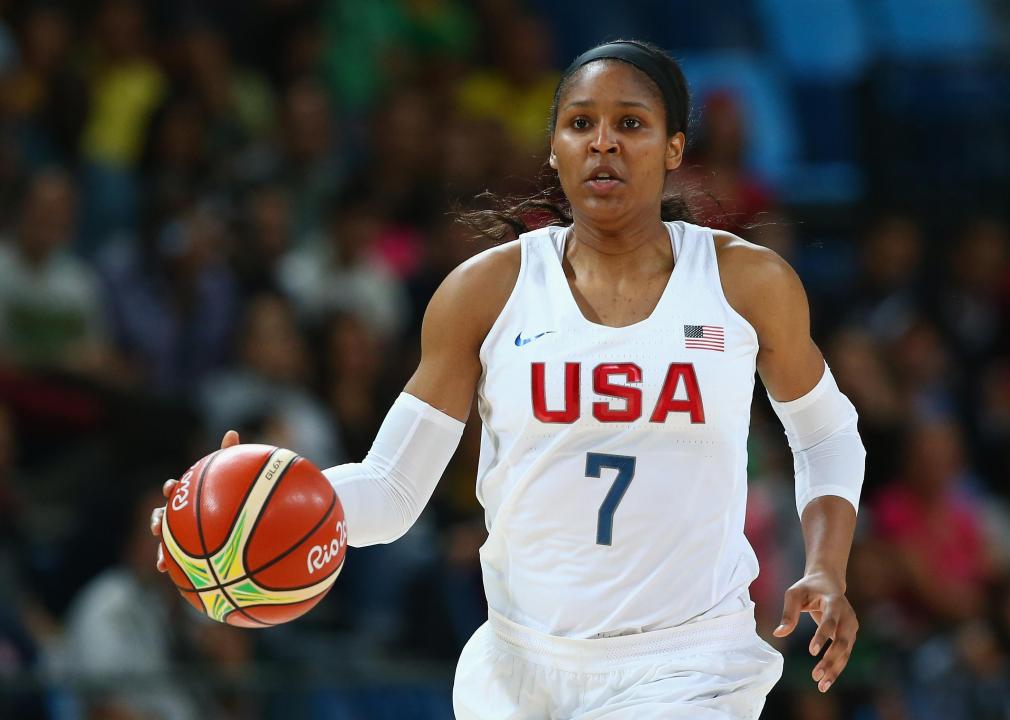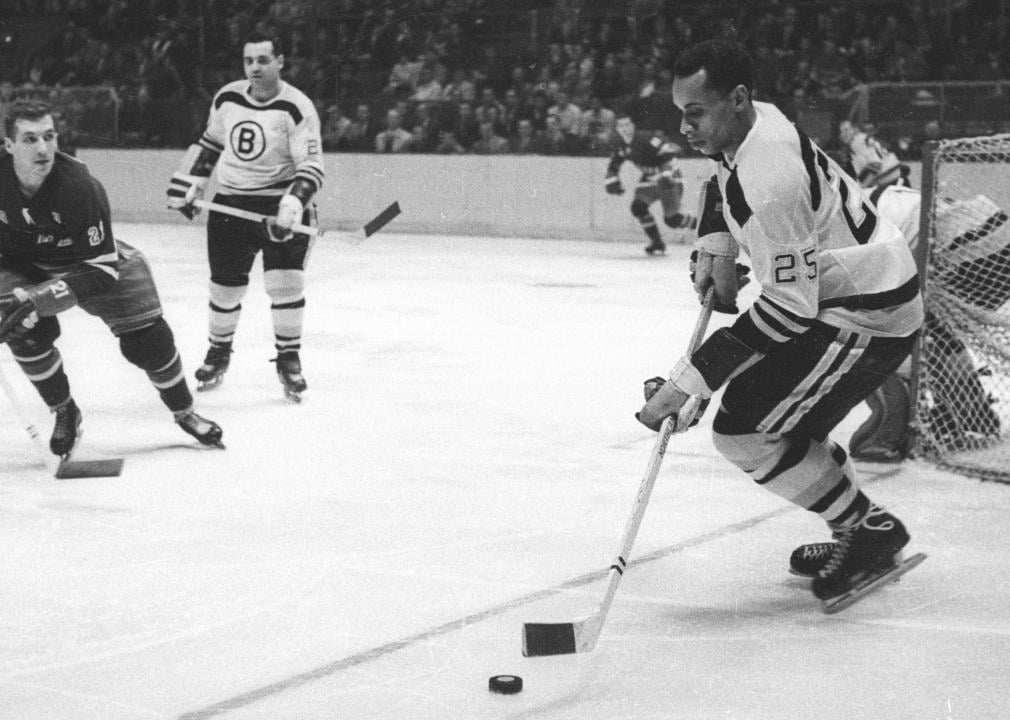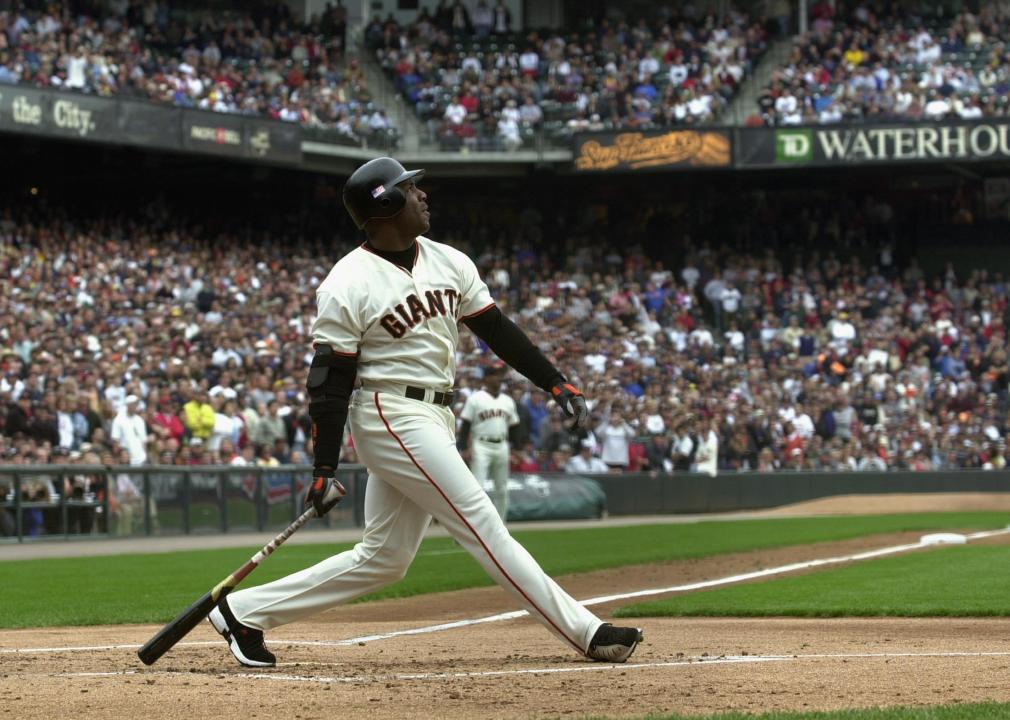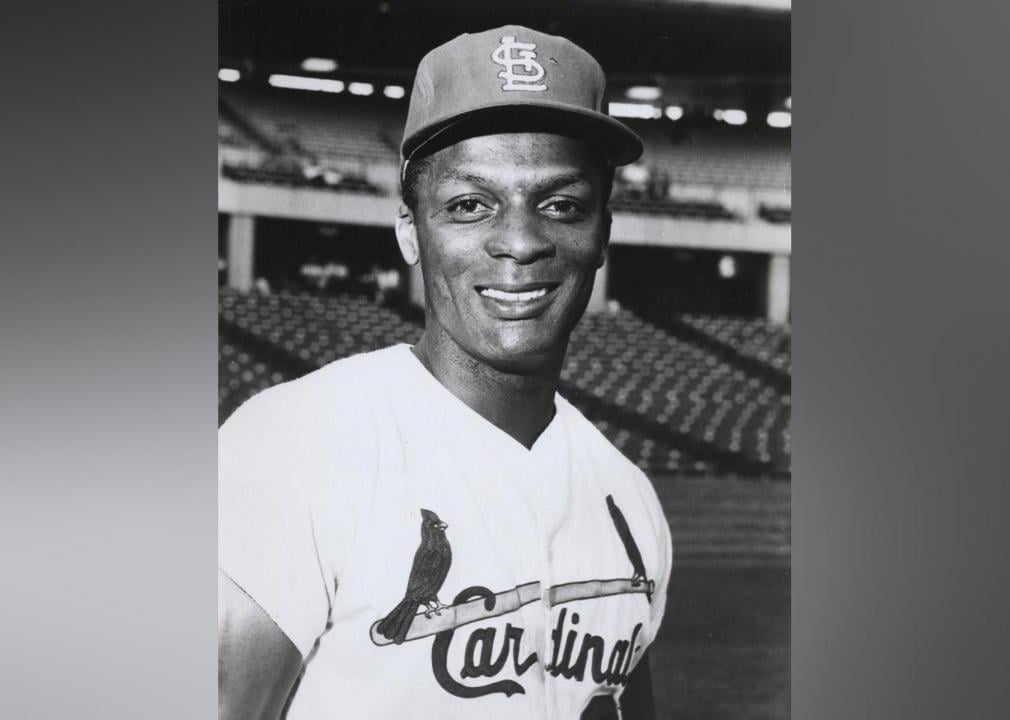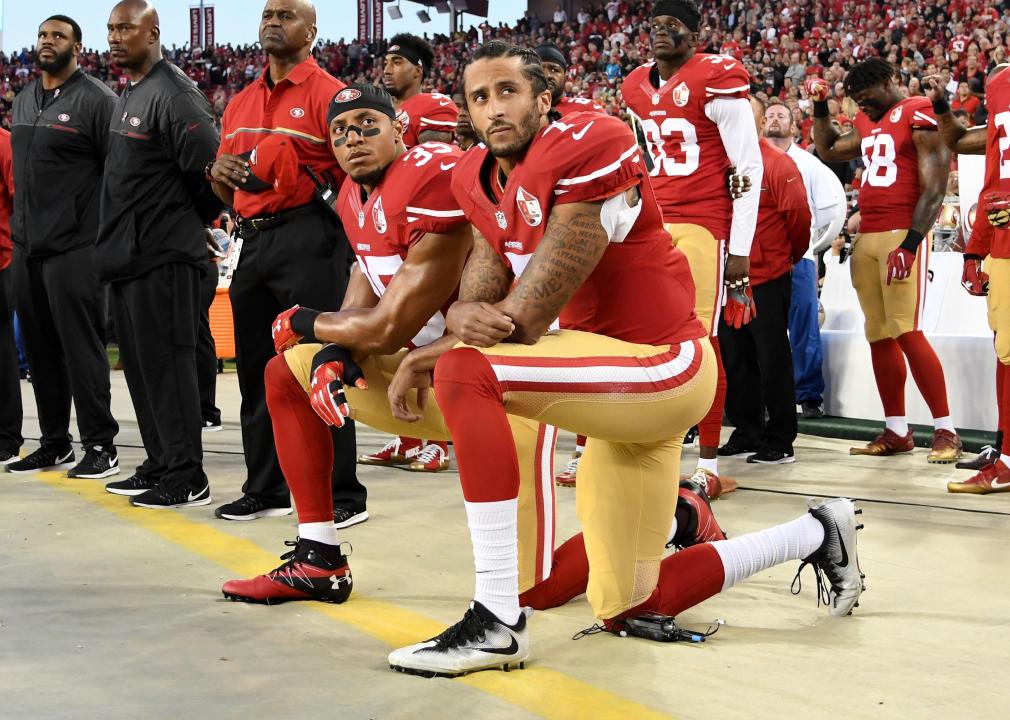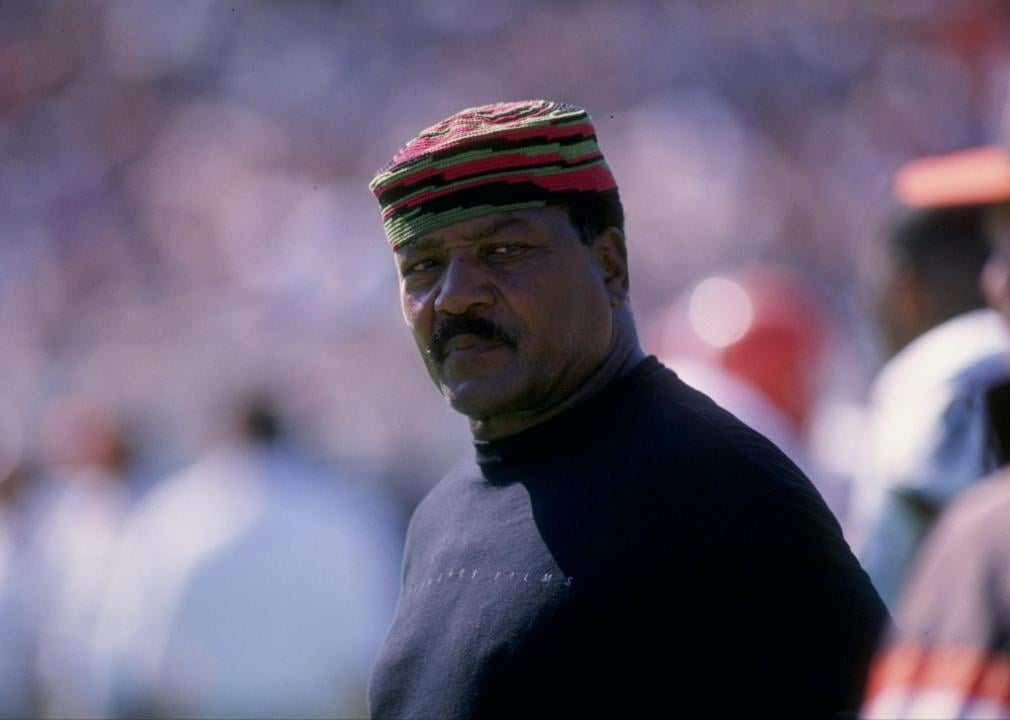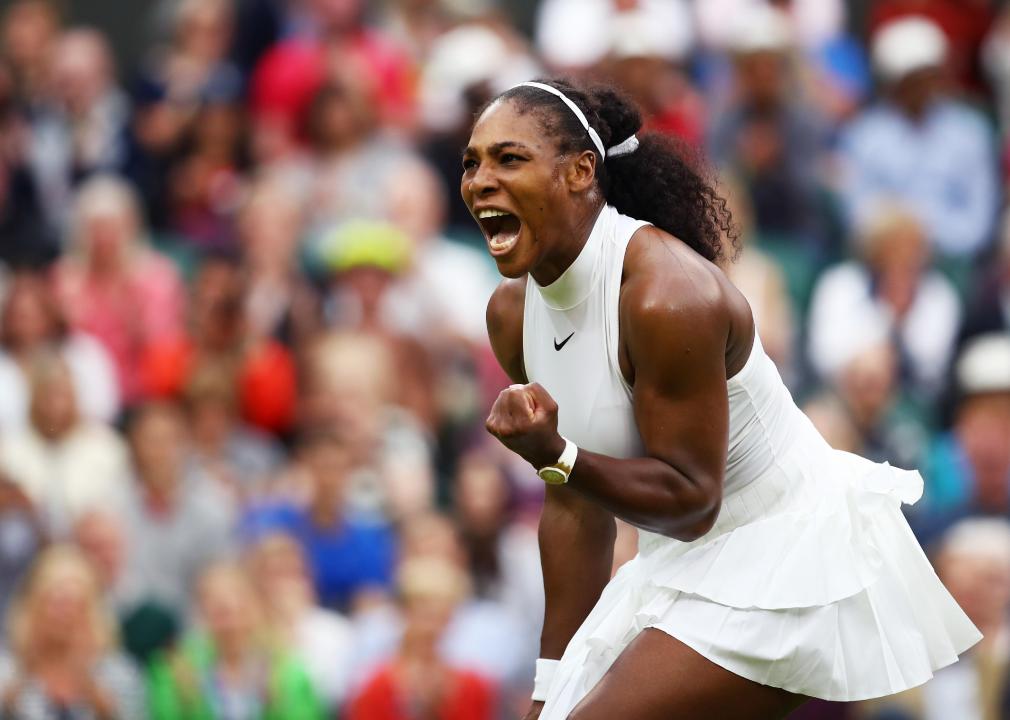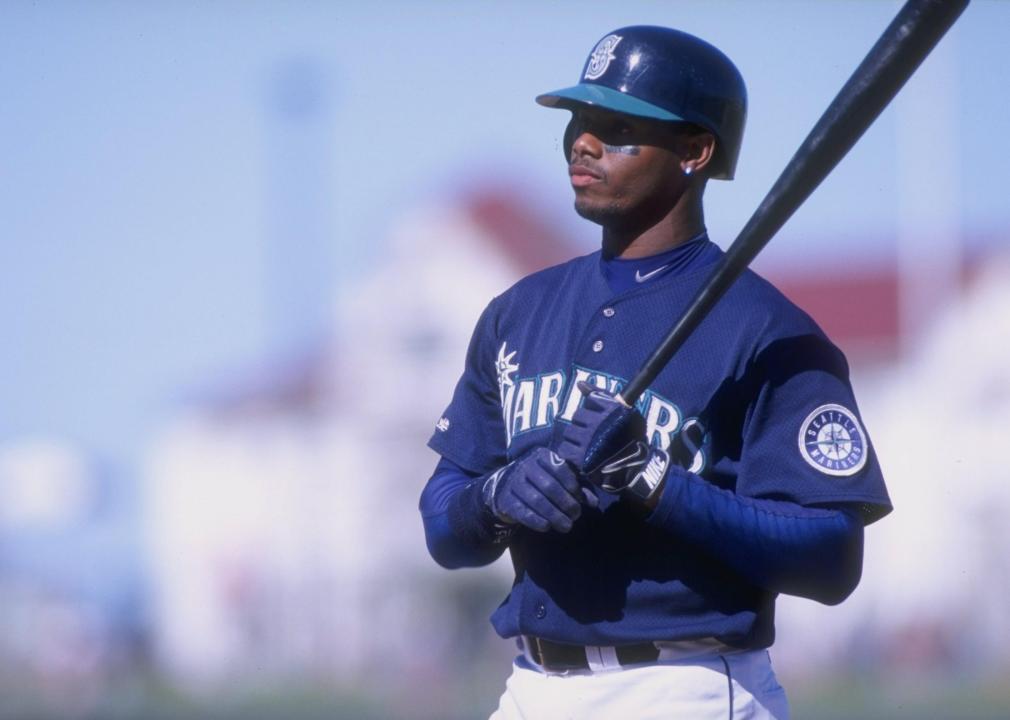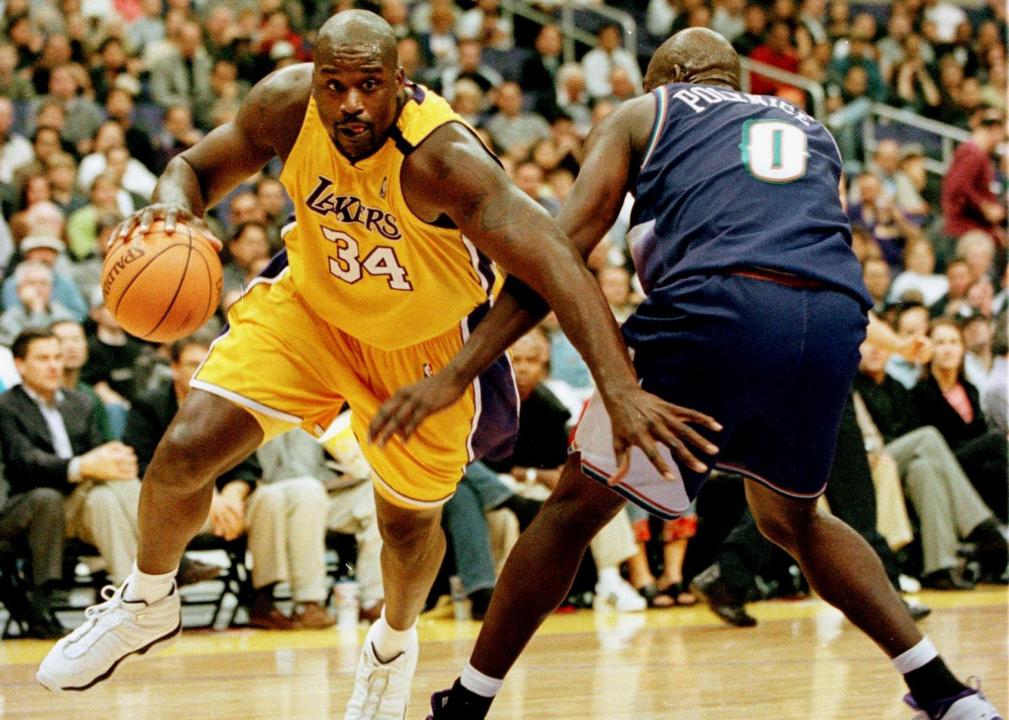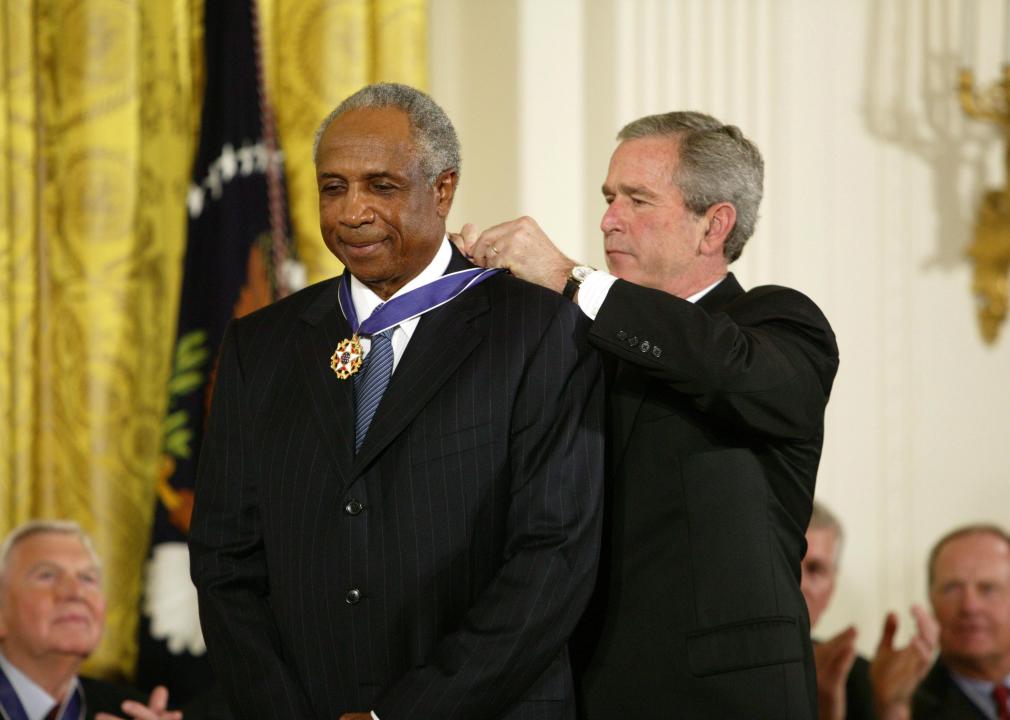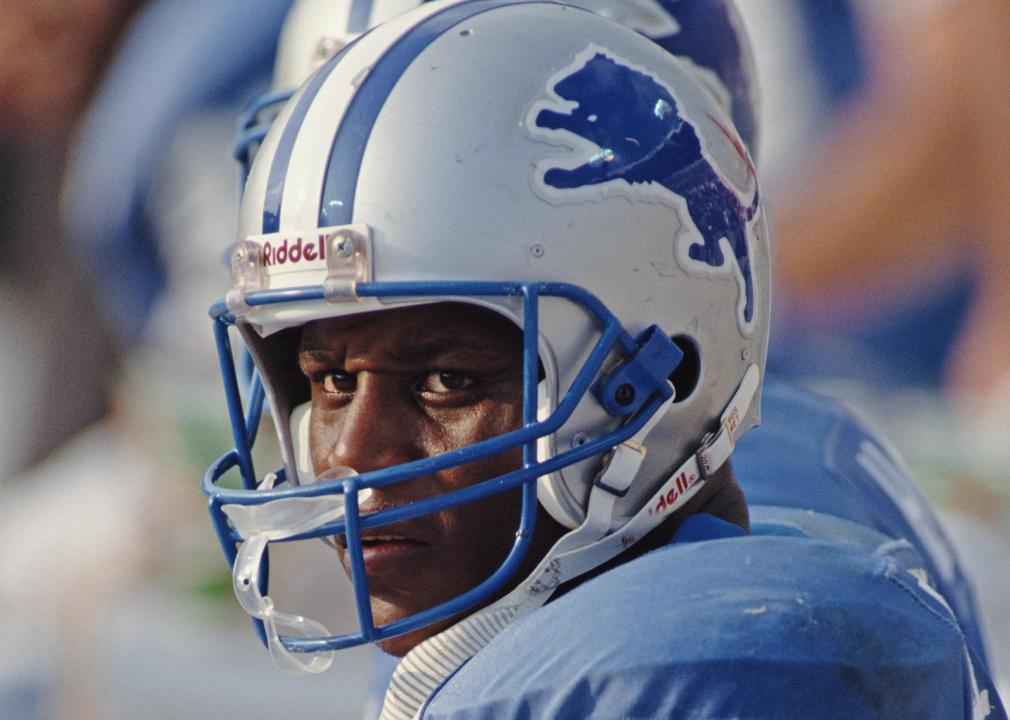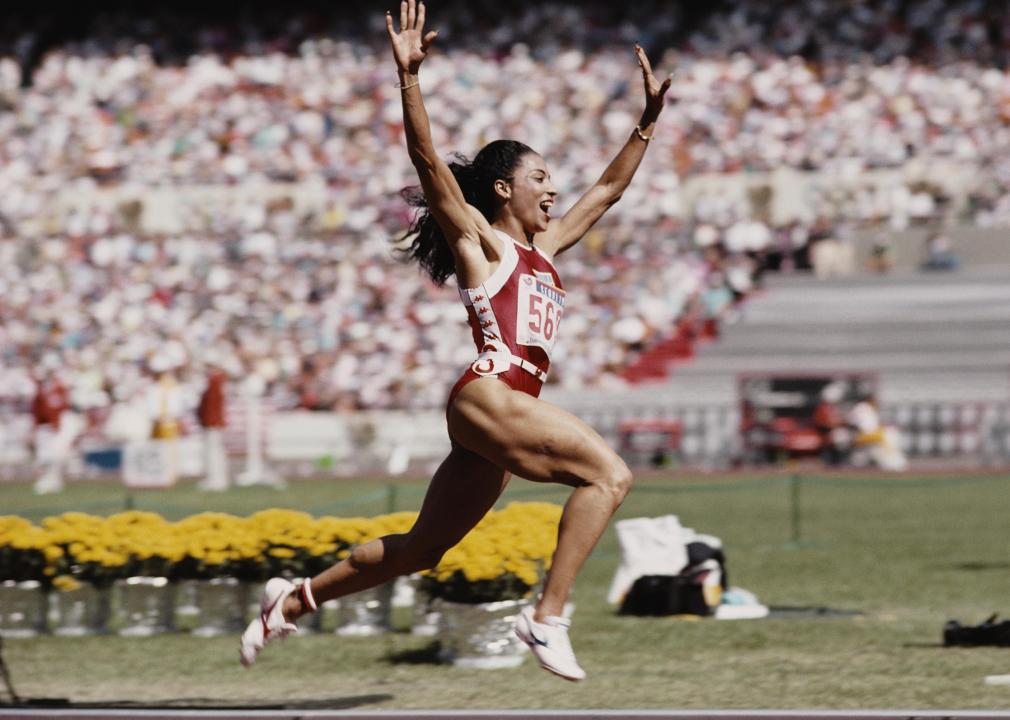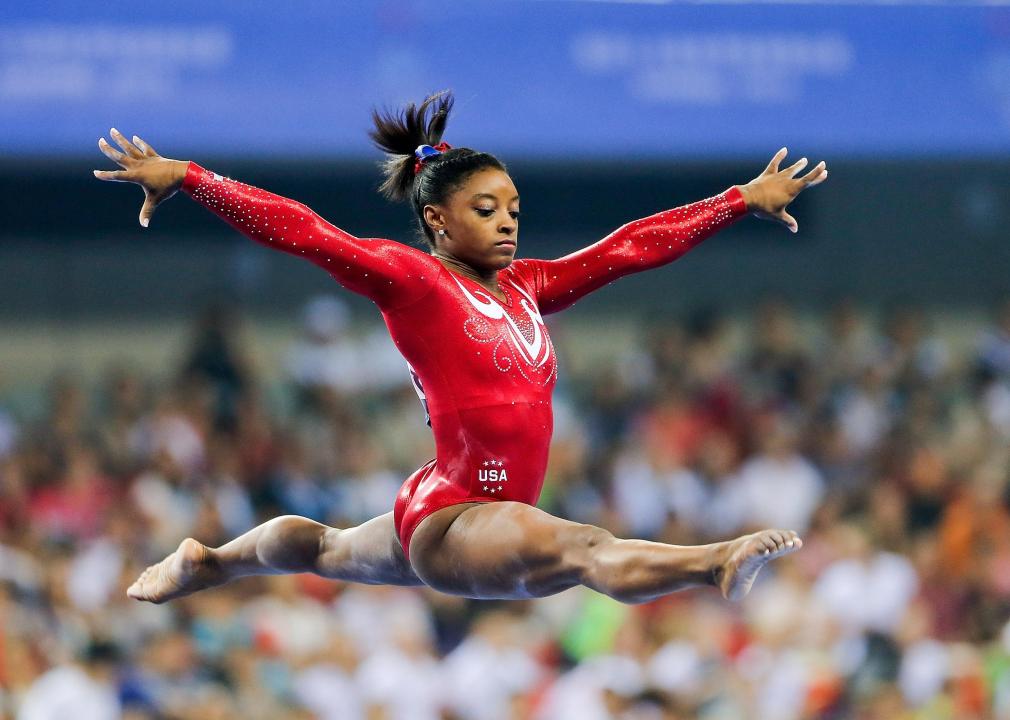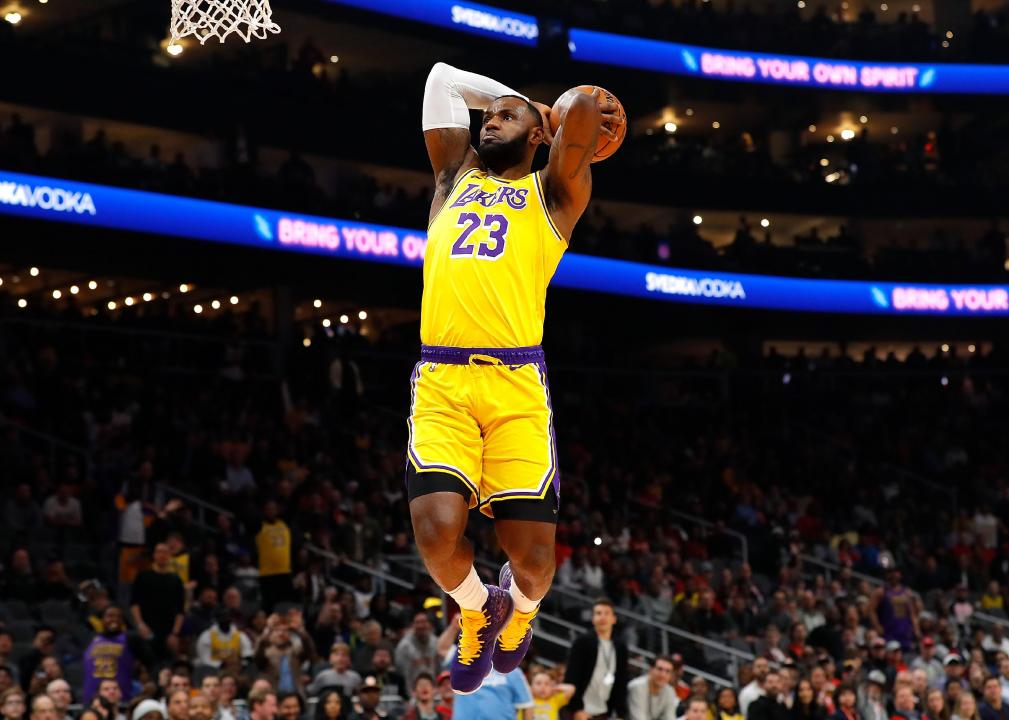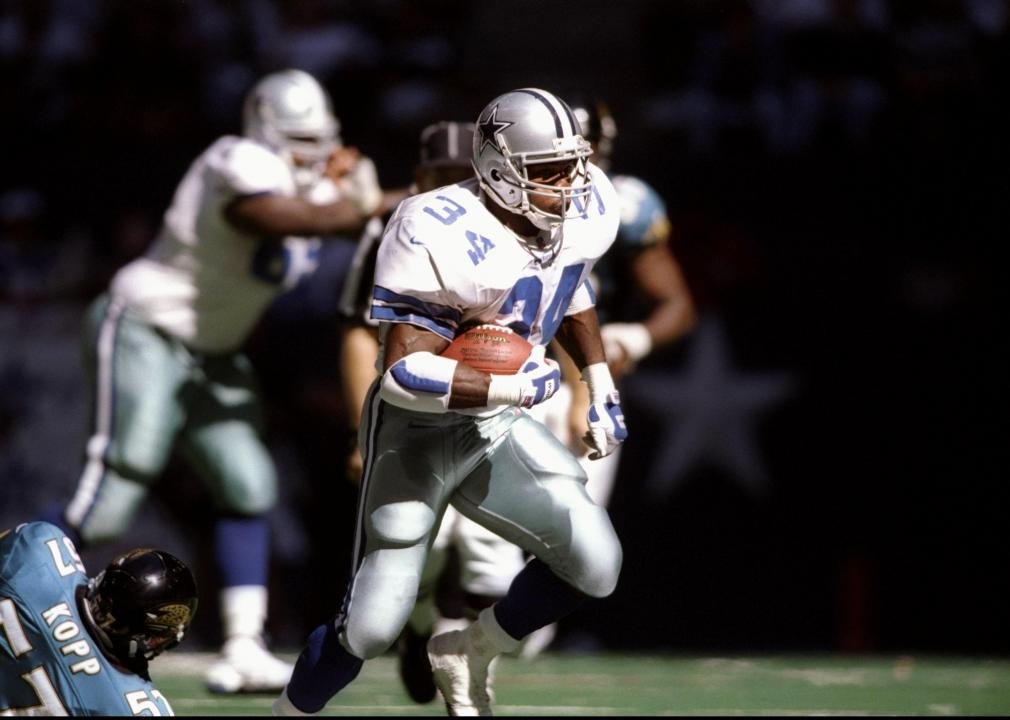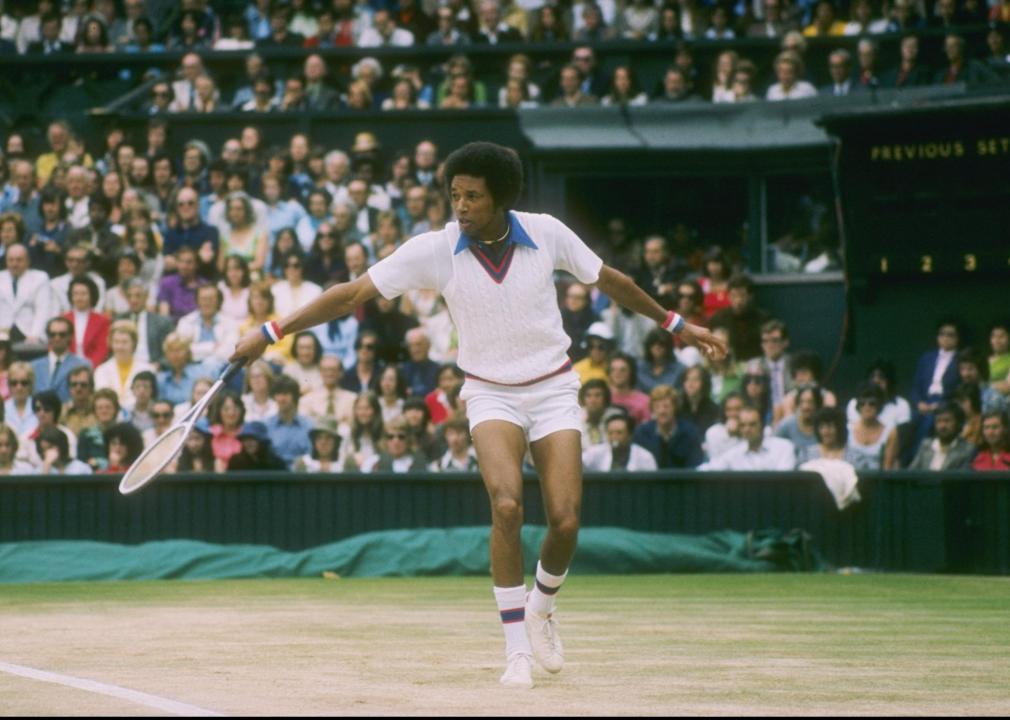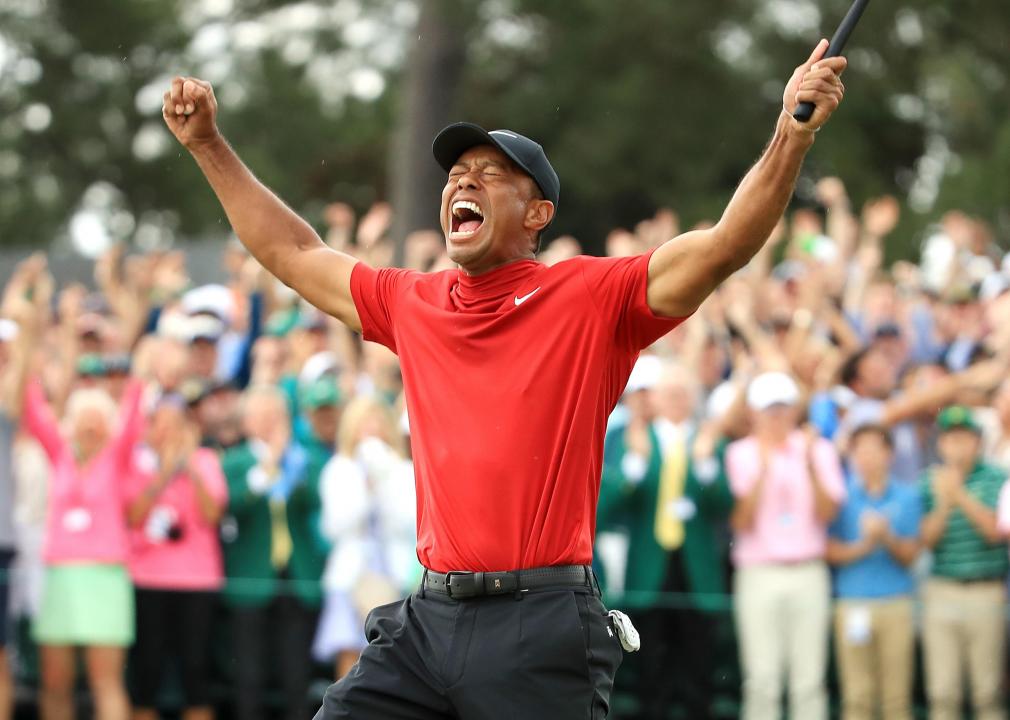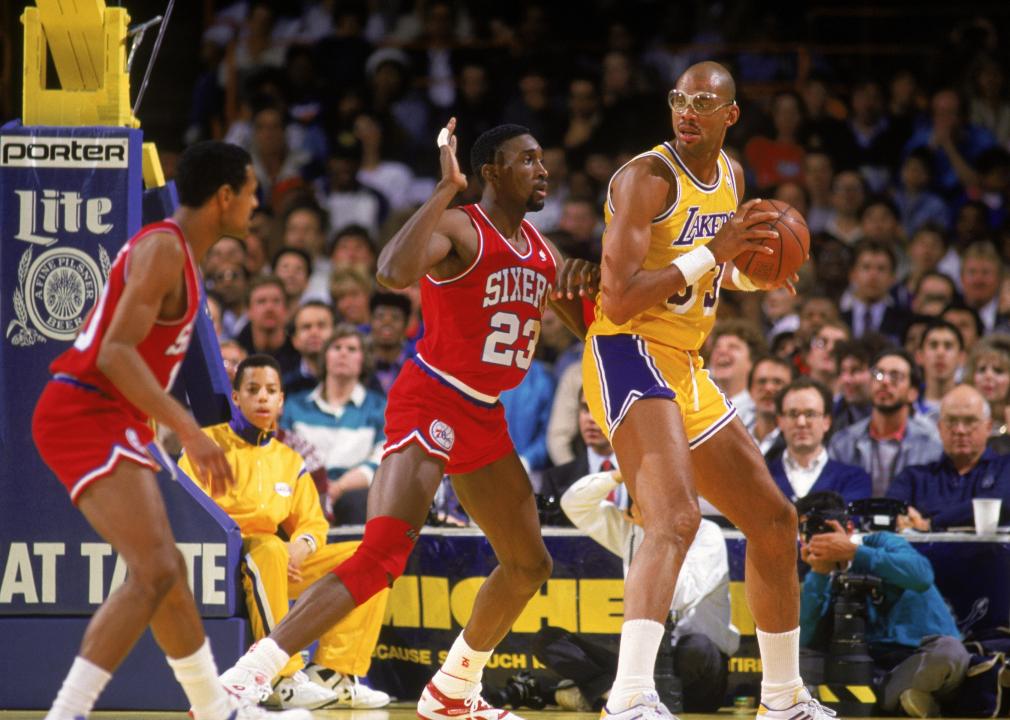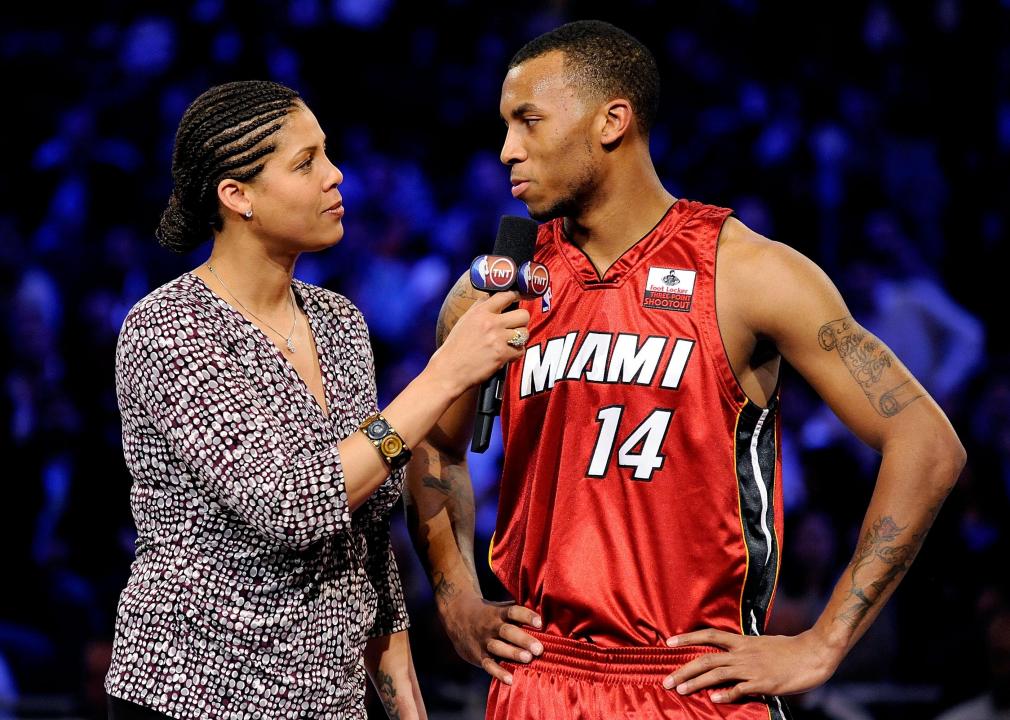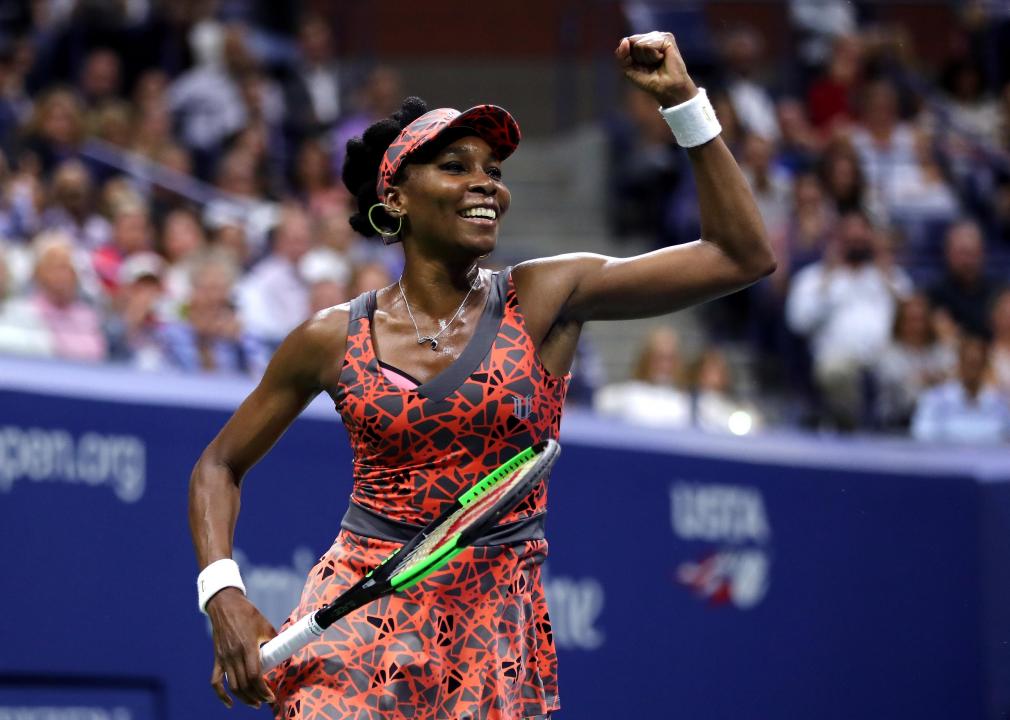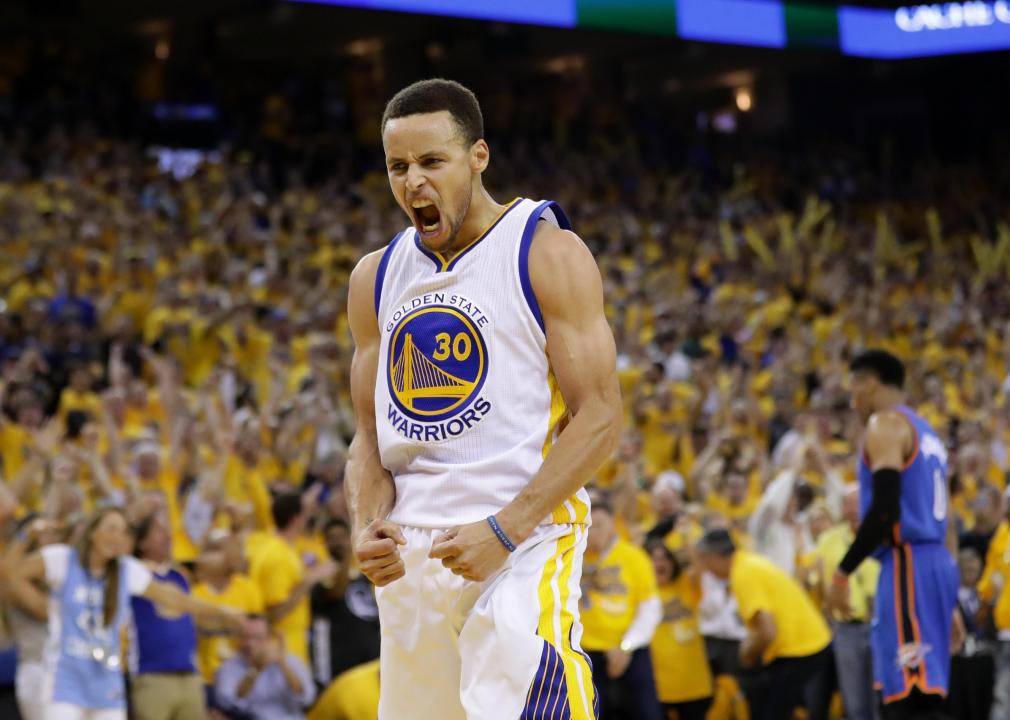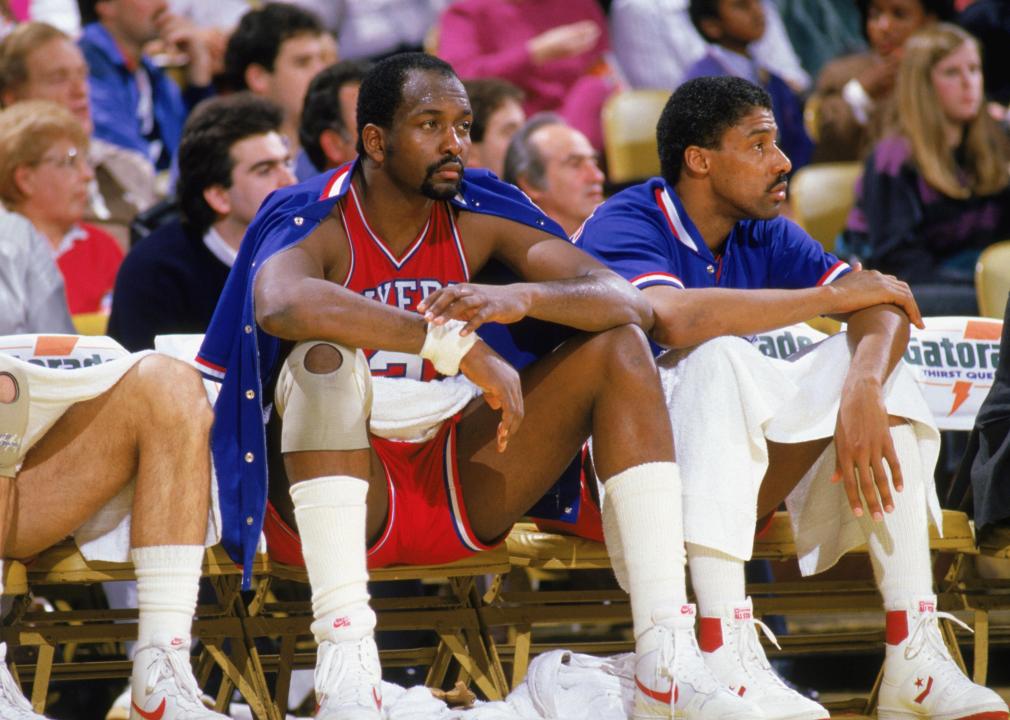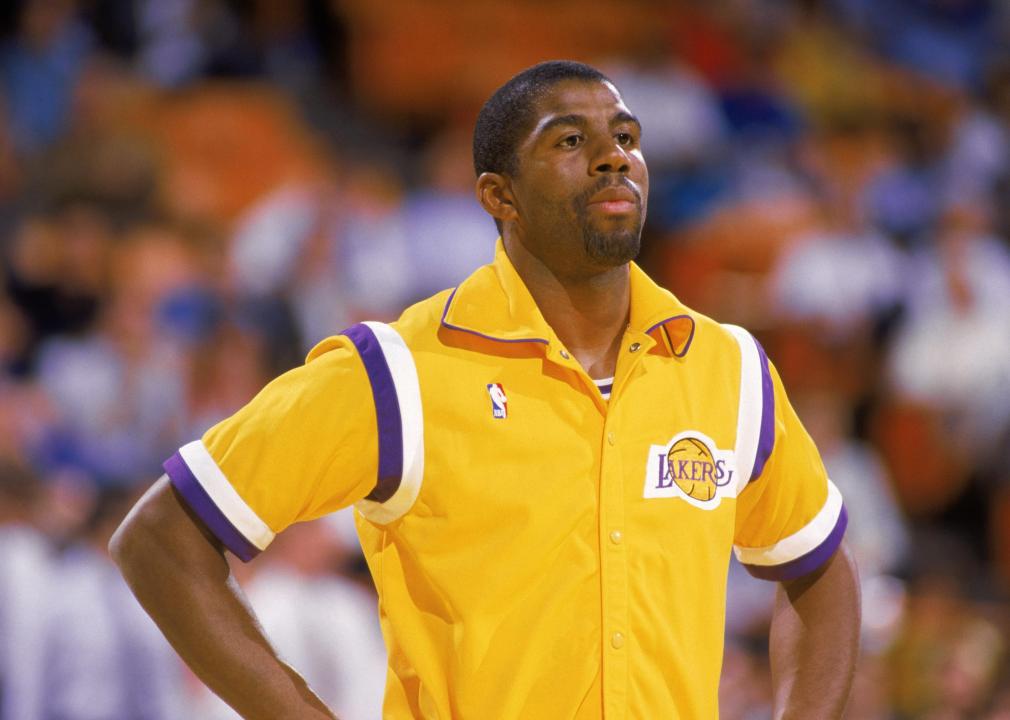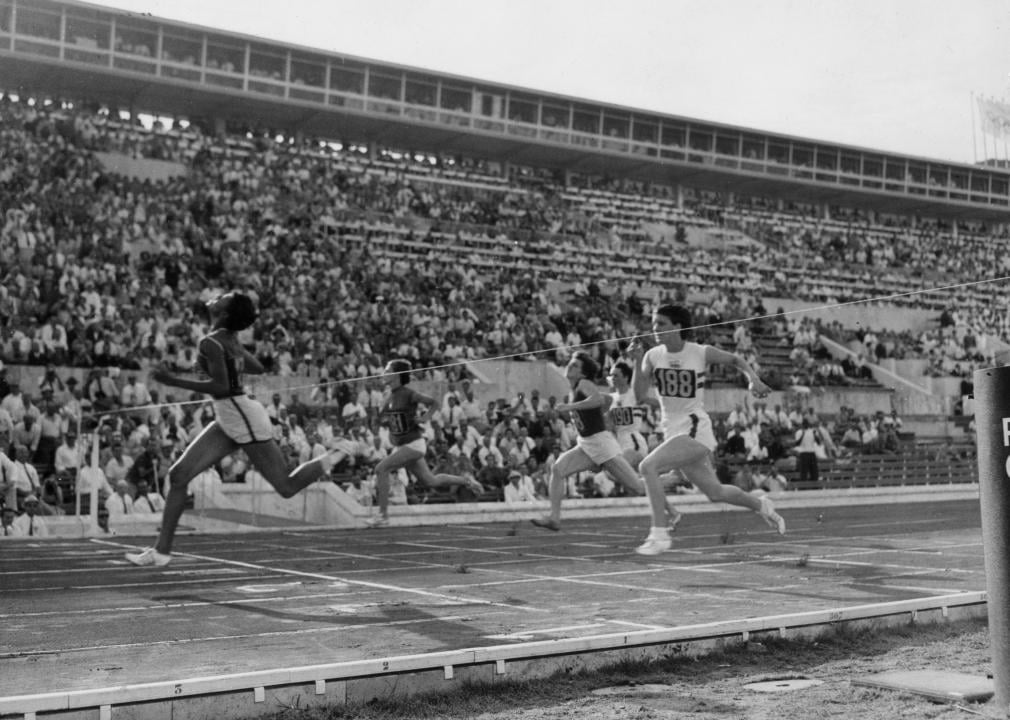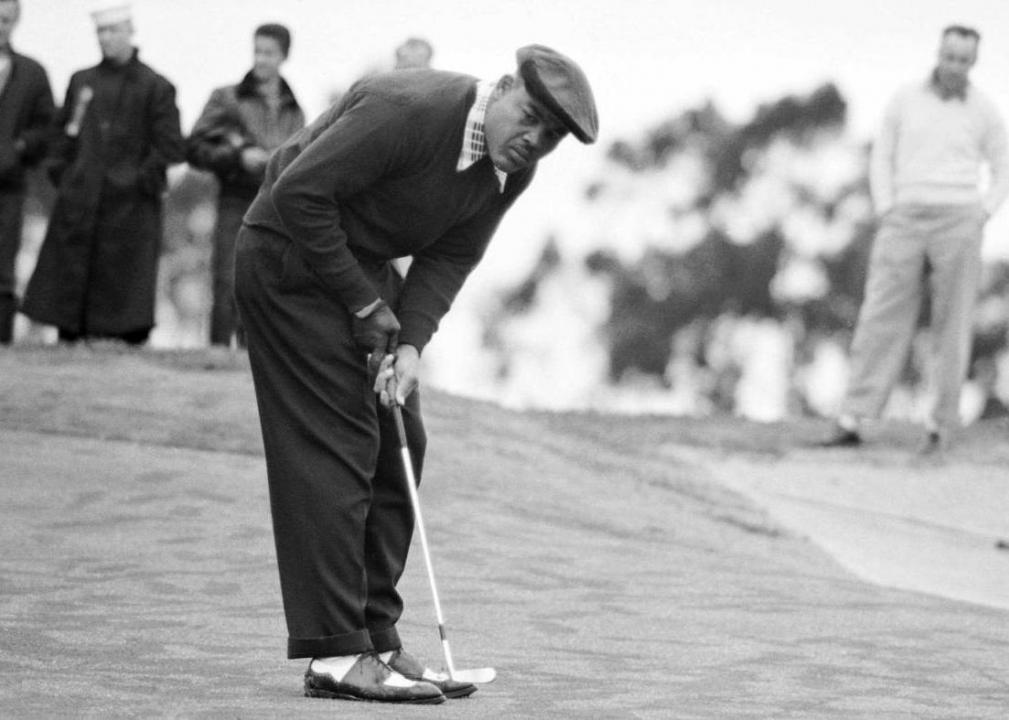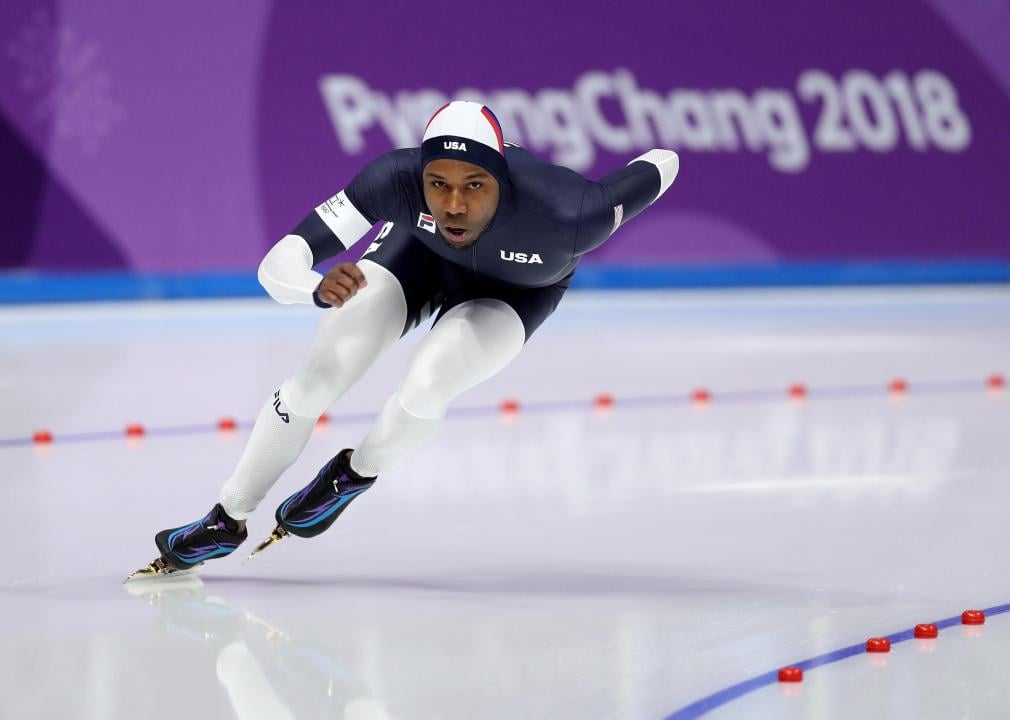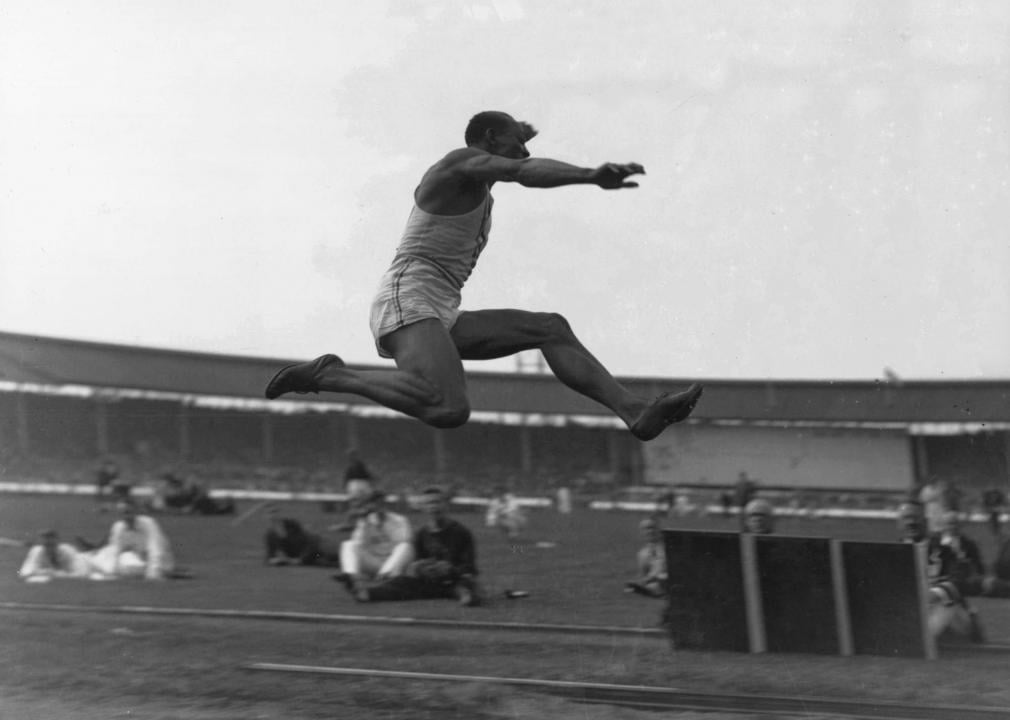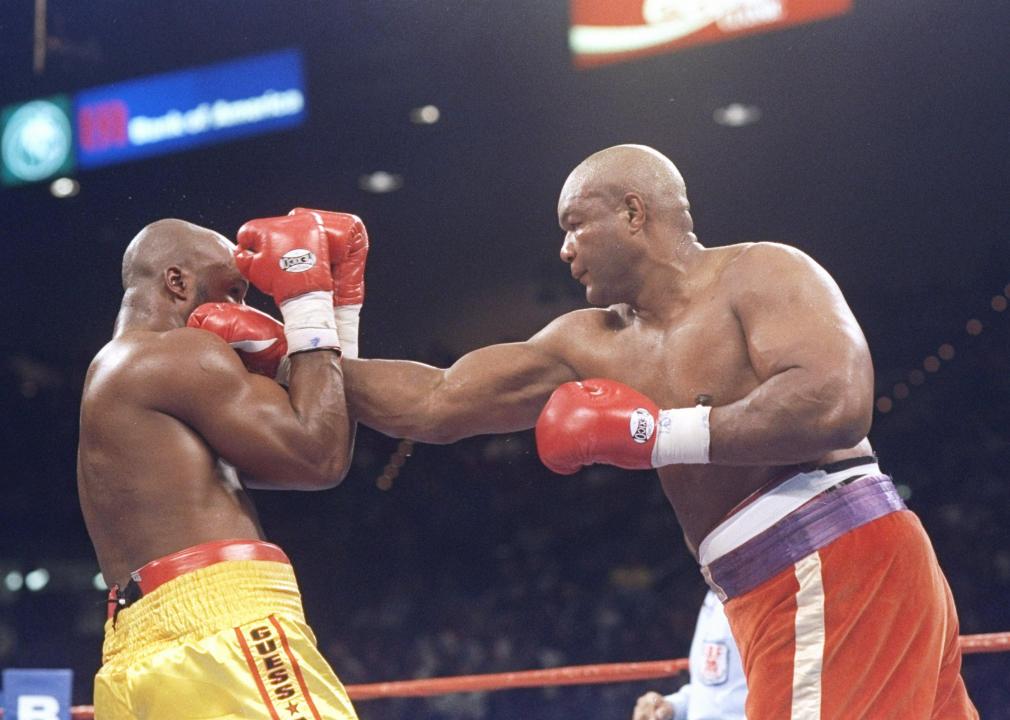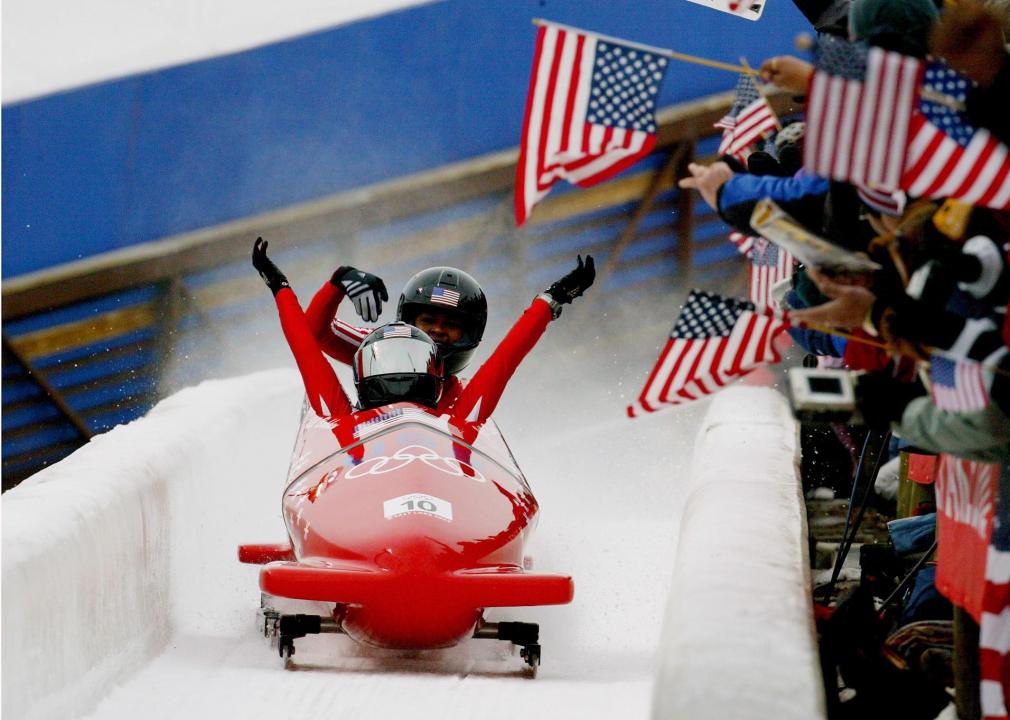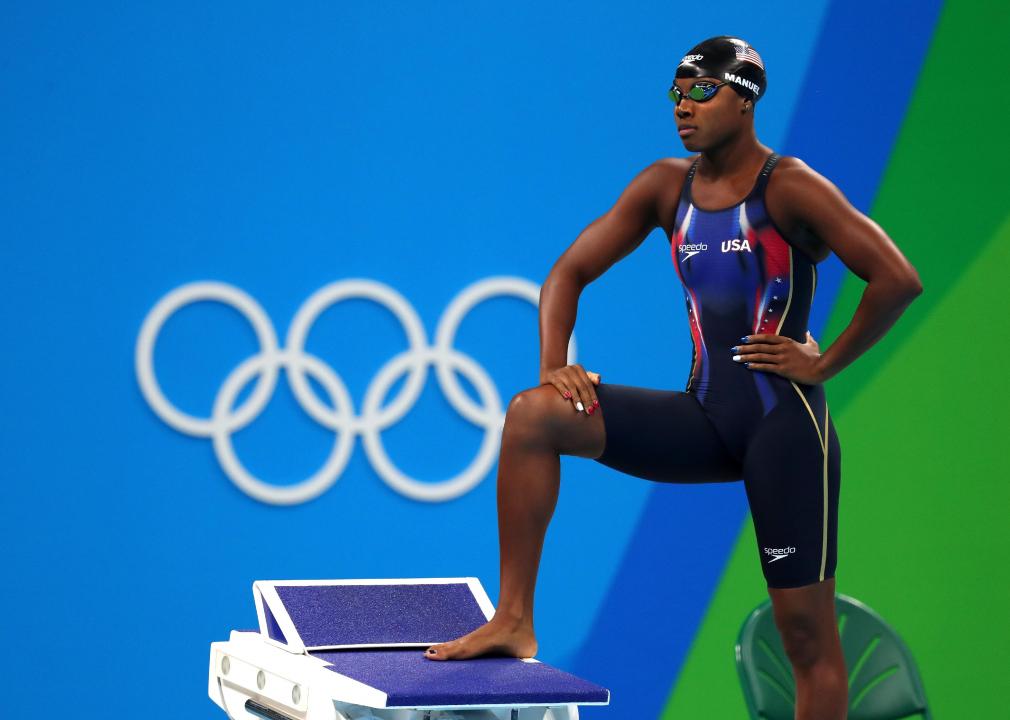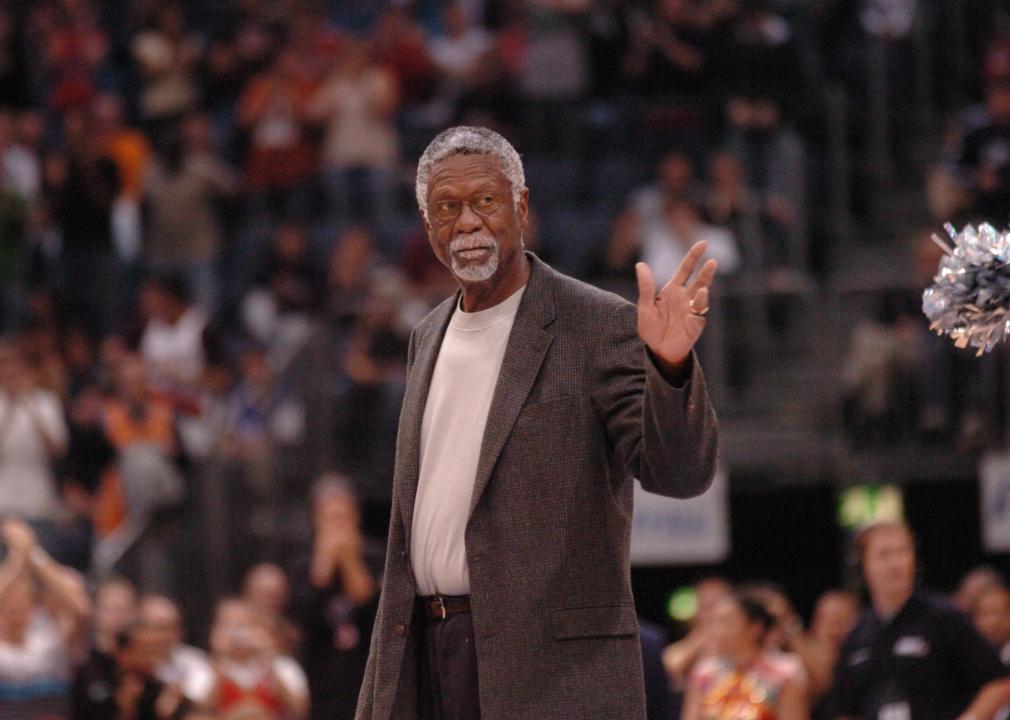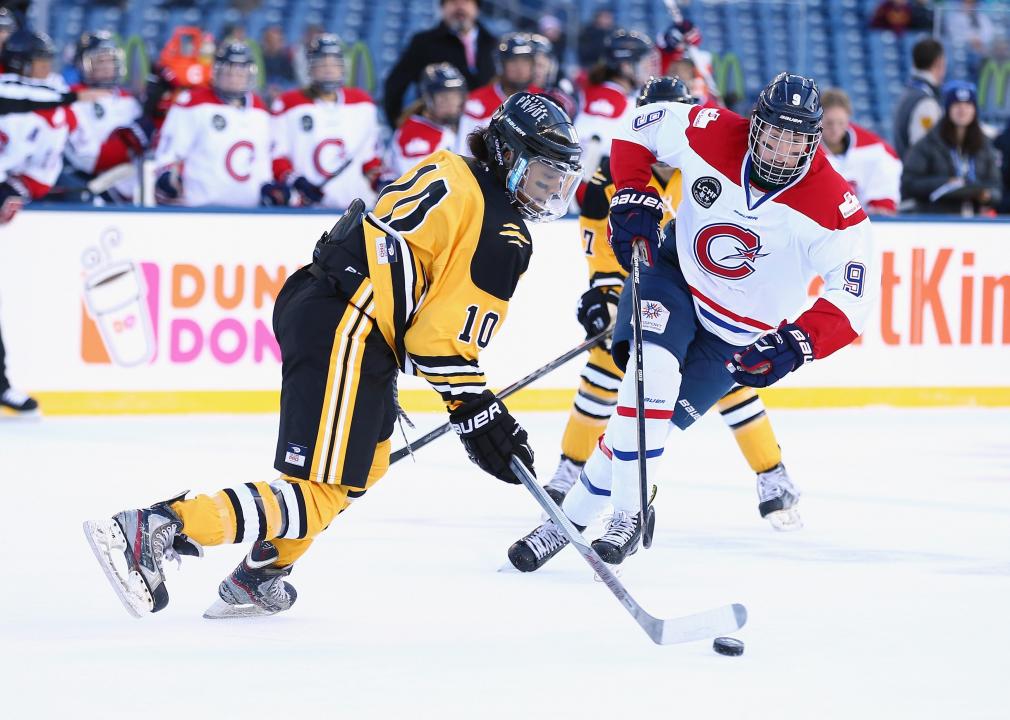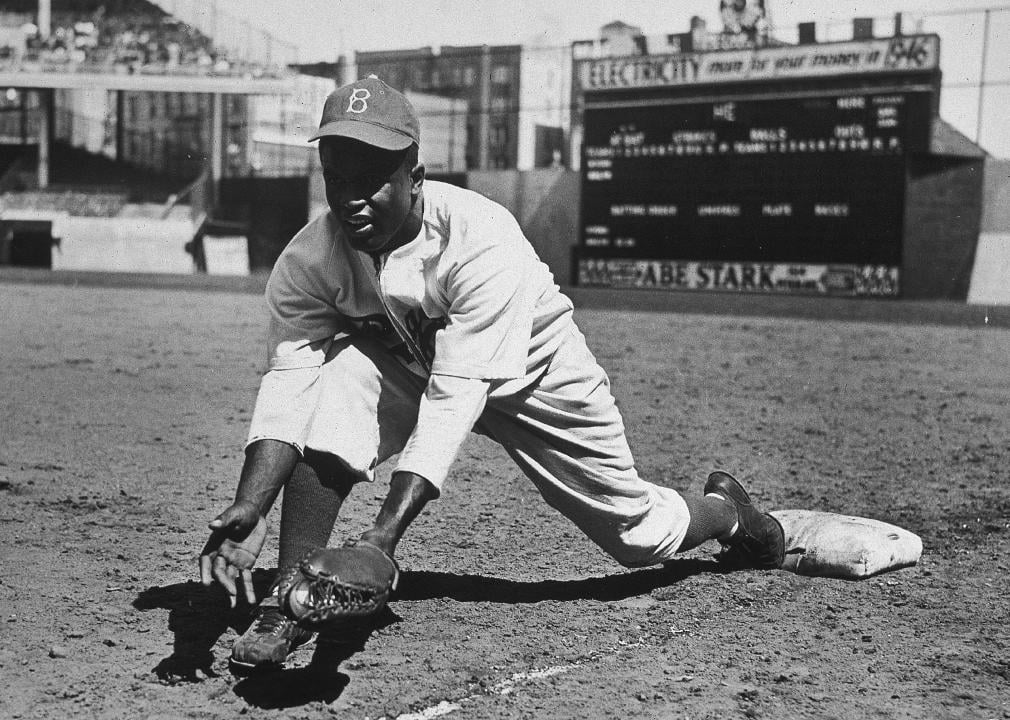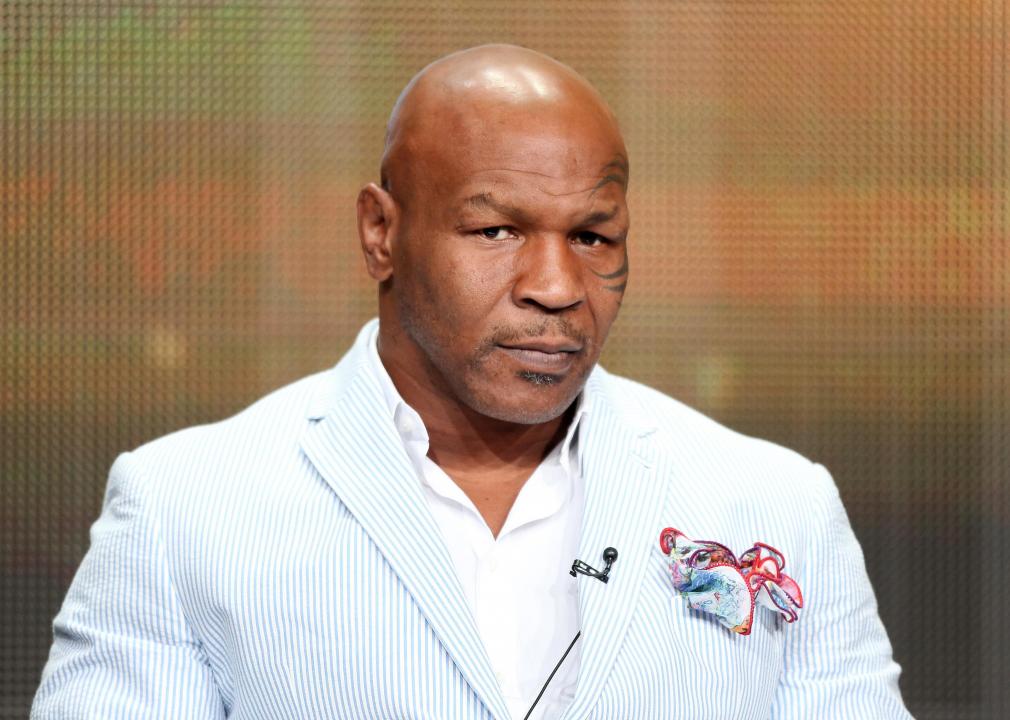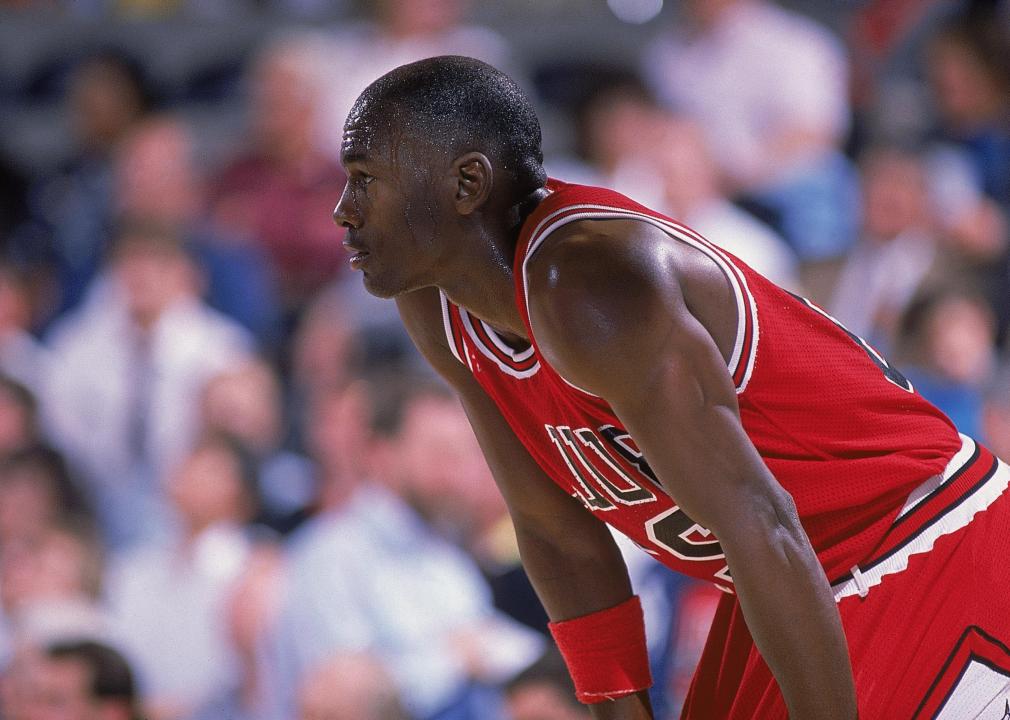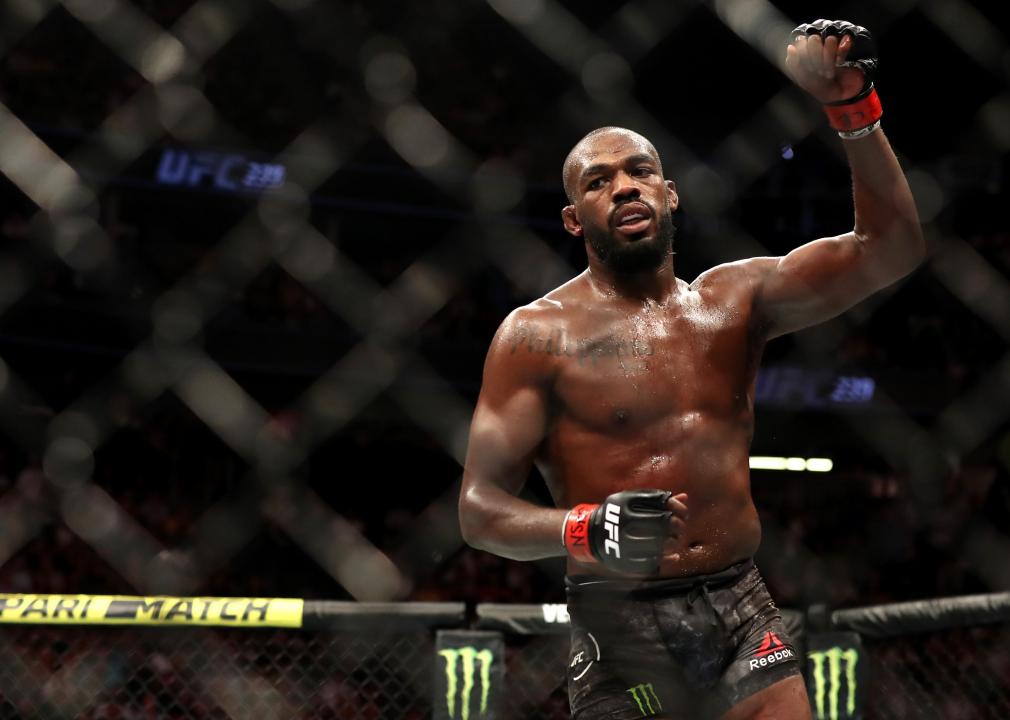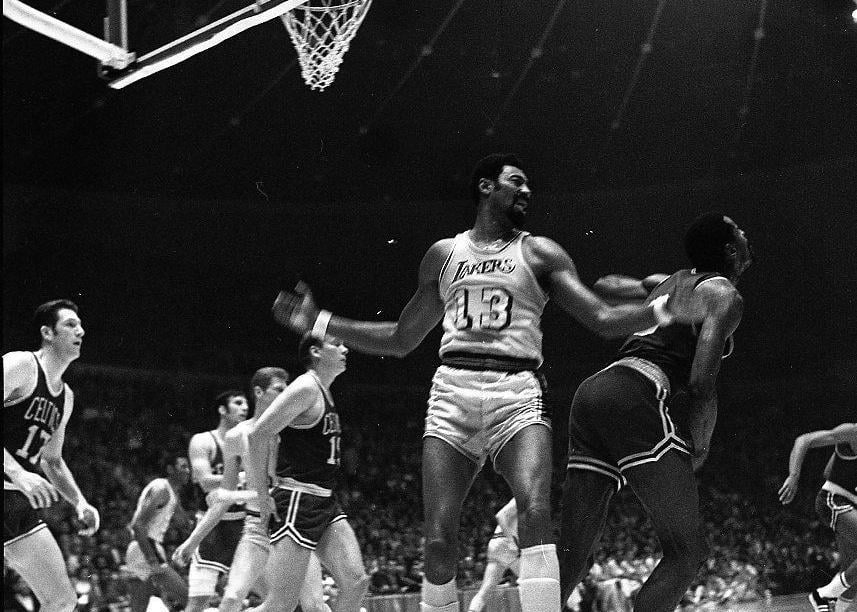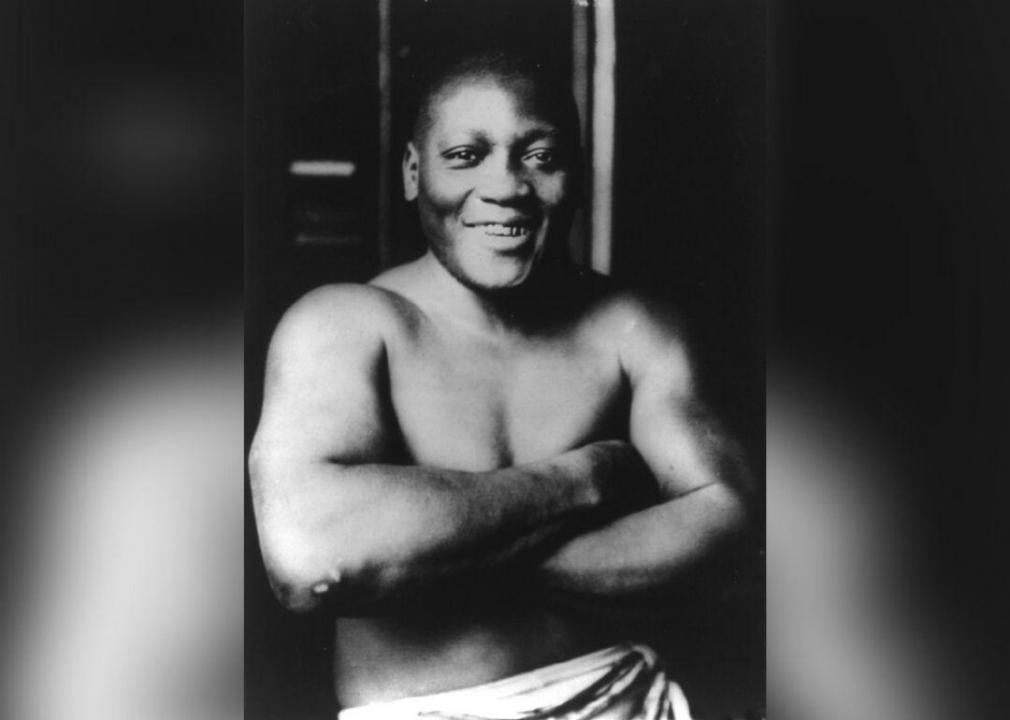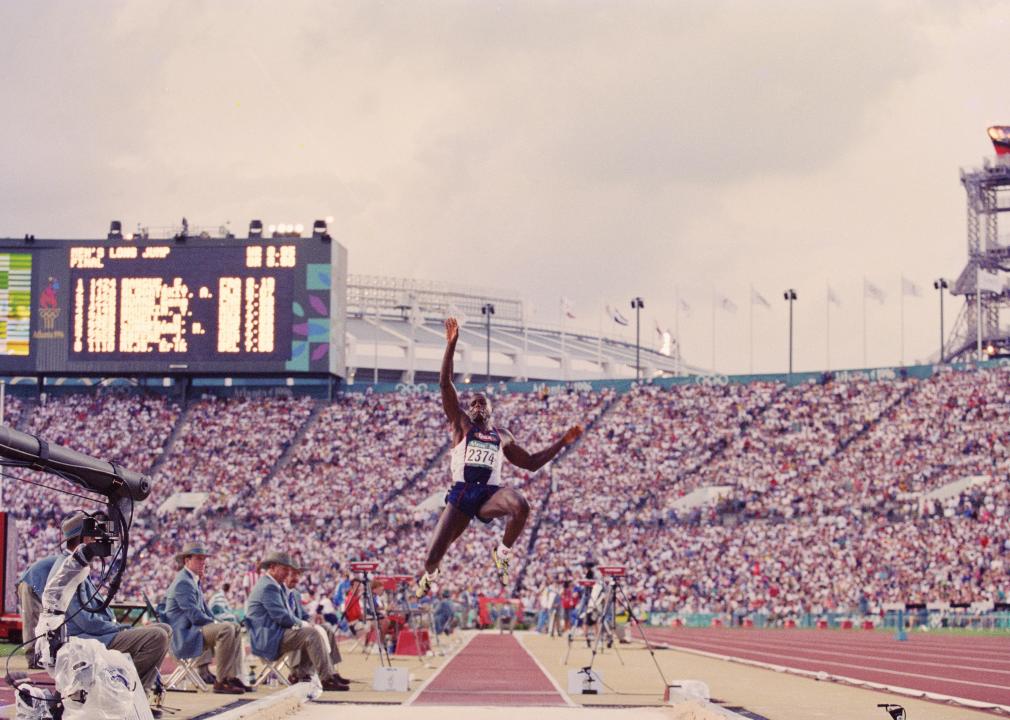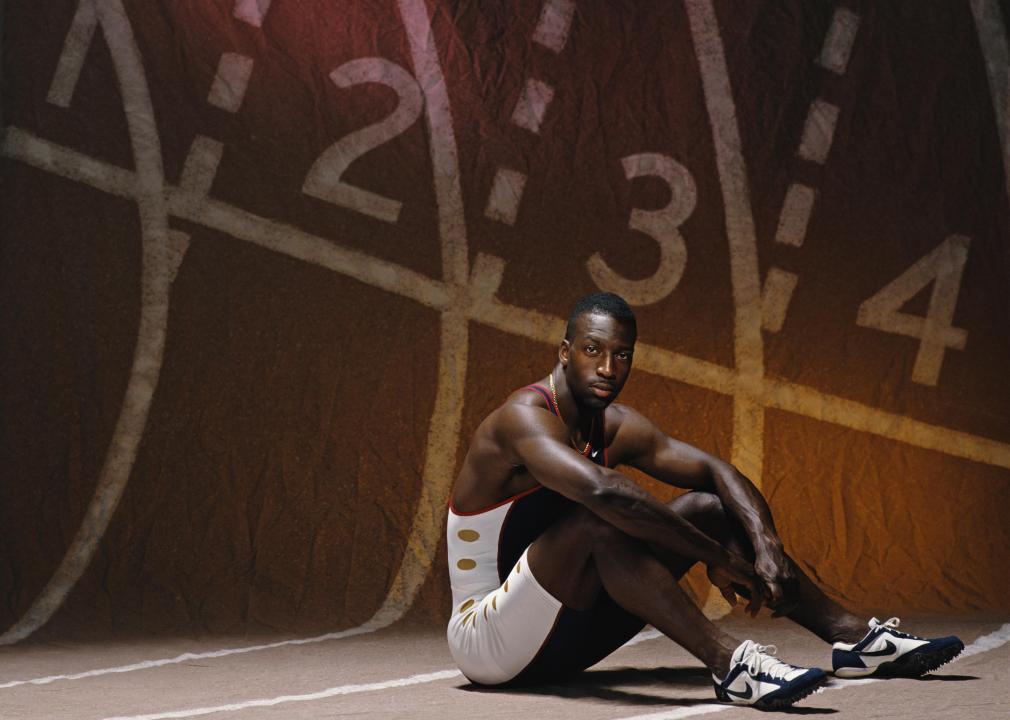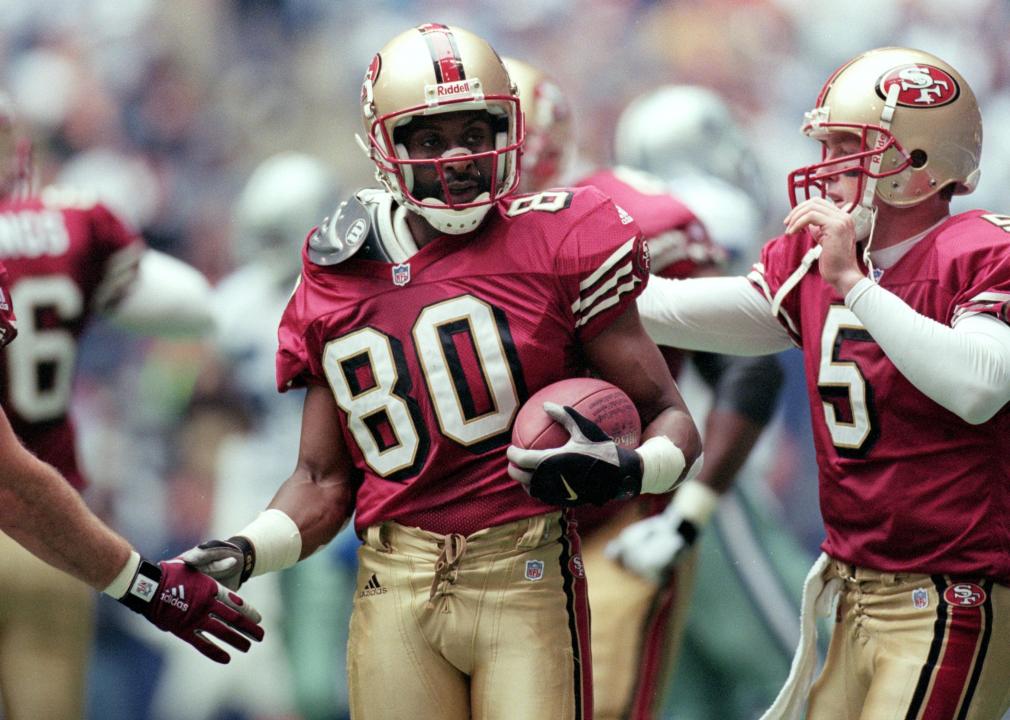Black athletes who transformed American sports
Mike Powell // Getty Images
Black athletes who transformed American sports
For much of the late 19th and early 20th centuries, Black athletes were forbidden from competing as professional athletes. But trailblazers like Jackie Robinson and Althea Gibson slowly chipped away at color barriers in American sports and opened up the floodgates for today’s stars to thrive.
Stacker compiled a list of Black athletes who transformed American sports using information from professional league record books, statistical databases, museums, historical articles, and other sources. Included in this list are names you might expect like the incomparable Willie Mays, who was idolized by legends like Ted Williams but also pushed for the integration of baseball by organizing offseason traveling tours that featured Black ballplayers. Muhammad Ali’s accomplishments in the ring and his activism outside of the ropes surely earn him a spot, but there are also pugilists like Jack Johnson, who was the first Black heavyweight champion of the world. Despite his athletic prowess, Johnson was shadowed by the enforcement of arcane laws throughout most of his life.
Do you know the name of the first Black hockey player to play in the National Hockey League? What about the speed skater who made history at the 2006 Olympics, or the former track star turned bobsled Olympic medalist? We dig into those biographies and more, paying respect to figures that continue to influence American society.
While this list is not exhaustive, the accomplishments of those included are sure to inspire. From overcoming diseases to segregation, learn about the legends of American sport who are responsible for the way we watch games today.
You may also like: The 50 largest college football stadiums
![]()
Tony Duffy // Getty Images
Jackie Joyner-Kersee
A six-time Olympic medalist, Jackie Joyner-Kersee is one of track and field’s most decorated athletes. Joyner-Kersee also won four world championships. A native of East St. Louis, she spoke out about overcoming asthma throughout her career.
JERRY SISKIND // Getty Images
Willie Mays
Ted Williams once said they invented the MLB All-Star Game for Willie Mays. A 24-time All-Star, Mays is one of baseball’s most accomplished players, but he also advocated for Black American athletes during his career. In the 1950s, Mays helped organize traveling tours that showcased some of the game’s best unseen Black talent.
Gallo Images // Getty Images
Laila Ali
An undefeated world boxing champion, Laila Ali sought to change perceptions of women in prizefighting. As the daughter of Muhammad Ali, Laila Ali’s fights drew more media attention to women’s boxing. In retirement, Laila Ali has often spoken out on social issues.
Agence France Presse // Getty Images
Muhammad Ali
Few American athletes have had an impact on society like Muhammad Ali. Born Cassius Clay, Ali, who converted to Islam, was a standout boxing champion who mastered the art of the interview and was not afraid to speak out against issues he deemed unjust. Later in life, Ali became a high-profile spokesperson in the battle to find a cure for Parkinson’s disease.
AFP via Getty Images
Althea Gibson
In 1950, Althea Gibson became the first Black tennis player to compete at the U.S. National Championships. Six years later, Gibson became the first Black athlete to win a tennis grand slam tournament, capturing the 1956 French Open. Gibson won five singles grand slam tourneys, and in 2019, a statue was unveiled in her honor on the grounds of the U.S. Open in New York.
You may also like: 30 famous people you didn’t know were college athletes
Mike Powel // Getty Images
Bo Jackson
A two-sport star in professional baseball and football, Bo Jackson helped redefine athletics in the 1980s. A hip injury incurred while playing football derailed Jackson’s career in both sports, but the glimpses of power, speed, and acumen were almost revelatory. Jackson’s versatility inspired future star athletes to compete in as many sports as possible.
Doug Pensinger // Getty Images
Lisa Leslie
A three-time WNBA most valuable player and two-time WNBA champion, Lisa Leslie is a pioneer of women’s pro basketball. At center, Leslie was a force on both ends of the floor but proved to be equally resonant off the court. Leslie helped change perceptions of female athletes by regularly modeling for fashion, and returning to the court after taking time off to start a family.
Alex Livesey // Getty Images
Maya Moore
After winning a bevy of championships in college and the WNBA, Maya Moore stepped away from the game last season to advocate for prison reform. Moore, a six-time WNBA All-Star, has also protested against police violence.
Bruce Bennett Studios // Getty Images
Willie O’Ree
In 1958, Willie O’Ree became the NHL’s first Black player. O’Ree only played 45 games but still remains invested in hockey and growing diversity in the sport.
Harry How // Getty Images
Barry Bonds
Barry Bonds holds MLB records for most career home runs (762) and most home runs in a single season (73). However, Bonds’ legacy is complicated, clouded by suspected use of performance-enhancing drugs (PEDs). For much of the 2000s, Bonds was a polarizing figure, clearly a monumental athlete who stirred controversy over PED usage in professional sports.
You may also like: The best streaming services for sports in 2021
St. Louis Cardinals // Wikimedia Commons
Curt Flood
Curt Flood’s fight to challenge MLB contracts paved the way for modern-day free agency in not only baseball, but all American professional sports. Flood believed contracts that bound a player to one team were unfair and took his argument to the Supreme Court. Flood was unsuccessful but inspired a new wave of athletes to push for—and win—free-agency rights.
Thearon W. Henderson // Getty Images
Colin Kaepernick
During the 2016 NFL season, Colin Kaepernick, distraught by the history of mistreatment against Black Americans and minorities (particularly by law enforcement), decided to kneel in protest during the pregame singing of the national anthem. “I am not going to stand up to show pride in a flag for a country that oppresses Black people and people of color,” Kaepernick said. Kaepernick, who started in the Super Bowl only a few years earlier, was soon out of the league. Fellow NFL players believed Kaepernick was blackballed for speaking out, but his outspokenness continues on today, and he laid the groundwork for future waves of athletic activism.
Markus Boesch // Getty Images
Jim Brown
Before Kaepernick, Jim Brown was the original NFL superstar fighting for a cause. Brown brought Black athletes together from various sports, and has helped with voter registration drives and Black entrepreneurialism. On the field, Brown was an All-American in lacrosse and football, and later was inducted into the Pro Football Hall of Fame.
Clive Brunskill // Getty Images
Serena Williams
With 23 titles, Serena Williams has won the most Grand Slam tournaments in the Open Era (since 1968). Williams has stressed throughout her career the importance of opening doors for others, and Serena along with sister Venus have inspired many of the WTA tour’s youngest stars. After taking time off to start a family, Williams was openly vocal in her return in discussing the difficulties of pregnancy, and in shedding stigmas around female athletes who choose to have children during their careers.
Jed Jacobsohn // Getty Images
Ken Griffey Jr.
With his backward cap, charismatic smile, and picturesque swing, Ken Griffey Jr. became a baseball superstar in the 1990s. Griffey was so iconic that Nike gave him a signature shoe, an honor rarely bestowed to baseball players. Griffey was almost universally beloved during a period when the sport was struggling through steroid scandals.
You may also like: Famous NFL players from every state
Jonathan Daniel // Getty Images
Doug Williams
In 1988, Doug Williams became the first Black quarterback to win a Super Bowl and be named the game’s MVP. Williams’ success also boosted the profile of players from Historically Black Colleges and Universities, as Williams was a product of Grambling State under legendary coach Eddie Robinson.
GERARD BURKHART // Getty Images
Shaquille O’Neal
Few athletes matched Shaq’s pop culture appeal during the 1990s, as he starred in movies and released platinum rap albums. Throughout his life, Shaq has spoken openly about his adopted father and the struggles children face when a biological parent leaves the household. As a Hall of Fame center, Shaq won four NBA titles and was a three-time Finals MVP.
Douglas A. Sonders // Getty Images
Frank Robinson
In 1975, Frank Robinson became the first Black manager in MLB history. A Hall of Fame player who won two World Series rings and was a two-time MVP, Robinson managed four franchises over four decades. Robinson paved the way for some of the game’s best managers like Dusty Baker, Dave Roberts, and Cito Gaston.
Rick Stewart // Getty Images
Barry Sanders
Barry Sanders was named to the Pro Bowl in each of his first 10 seasons. He seemed destined to rack up a few more Pro Bowl nods but retired after his 10th NFL year. While many fans were puzzled as to why a future Hall of Famer would leave so early, Sanders saved his body from further wear as his desire to play the game waned.
Russell Cheyne // Getty Images
Florence Griffith Joyner
Florence Griffith Joyner was a world-record sprinter, Olympic gold medalist, and beacon of individuality with her fluorescent track attire. “Flo-Jo” became a well-known supporter of youth fitness and worked in the fashion industry. Griffith Joyner died in 1998, after a severe seizure while sleeping.
You may also like: Iconic sports moments that defined the ’60s
Lintao Zhang // Getty Images
Simone Biles
With four Olympic gold medals and 19 World Championship wins, Simone Biles is one of gymnastics’ most decorated athletes. But her bravery in revealing sexual abuse by former Team USA doctor Larry Nassar is also one of Biles’ most impactful acts.
Kevin C. Cox // Getty Images
LeBron James
LeBron James has multiple NBA championships and is a hybrid of power, finesse, vision, and athleticism rarely seen on a court. Along with being perhaps the most recognizable athlete in the world, James uses his spotlight to increase education initiatives and causes outside of sports. As James has gotten older, he’s shed stereotypes about athletes and how megastars can use their platforms.
Stephen Dunn // Getty Images
Herschel Walker
Thirty-seven years after Kenny Washington became the first Black player in the modern NFL, Herschel Walker spurned the world’s top professional football league. In 1983, instead of returning to college, Walker signed with the USFL, which unlike the NFL, allowed players to turn pro before their senior season. Years later, the NFL changed the rule; today, to enter the NFL draft, “players must have been out of high school for at least three years and must have used up their college eligibility before the start of the next college football season.”
Tony Duffy // Getty Images
Arthur Ashe
During the 1960s and ’70s, Arthur Ashe became the first Black male to win the Australian and U.S. Opens, and Wimbledon. In the 1980s, Ashe contracted HIV and became outspoken in AIDS awareness and for helping those afflicted by the disease. After tennis retirement, Ashe also protested on behalf of Haitian refugees.
Andrew Redington // Getty Images
Tiger Woods
Tiger Woods’ win at the 1997 Masters changed golf. Not many knew how to adjust to the new wave, with former Masters champion Fuzzy Zoeller making racially insensitive comments about Woods’ win. Woods brushed off the jabs and went on to win 14 more Major tournaments.
You may also like: 25 ways the MLB has changed in the last 50 years
Mike Powell // Getty Images
Kareem Abdul-Jabbar
With his signature goggles and skyhook jump shot, Kareem Abdul-Jabbar is one of basketball’s most recognizable athletes. Abdul-Jabbar retired as the NBA’s all-time leading scorer, a six-time champion, and six-time MVP. Since then, he’s supported pay for college athletes and protecting freedom of speech and religion.
Kevork Djansezian // Getty Images
Cheryl Miller
During the 1980s, Cheryl Miller was one of the best women’s basketball players in the world. A two-time NCAA national champion and Olympic gold medalist, Miller, a Hall of Famer, did not play long enough to see the WNBA but still made her mark. After her career, Miller became one of the more well-known basketball voices on NBA broadcasts.
Elsa // Getty Images
Venus Williams
Shortly after turning 20, Venus Williams won her first Grand Slam title at Wimbledon. Williams also won the doubles tournament with sister Serena, and together they formed one of women’s doubles most successful teams ever. In all, Venus has 21 Grand Slam titles in singles and doubles, and an additional two in mixed doubles. Throughout her career, she has also been a proponent for equal pay for women’s tennis players.
Ezra Shaw // Getty Images
Stephen Curry
Stephen Curry entered the league as a scrawny, baby-faced rookie best known for being the son of former NBA sharpshooter Dell Curry. Within a few years, Curry transformed basketball, popularizing the three-point shot from almost anywhere beyond half court. Today, young kids crowd gyms no longer fascinated by dunks, but instead by draining three-pointers like Curry, a three-time champion and two-time league MVP.
Rick Stewart // Getty Images
Moses Malone
Moses Malone had just graduated high school when he was drafted into the American Basketball Association. As the “first modern basketball player to go directly to the pros,” Malone set a template for the likes of Kevin Garnett, Kobe Bryant, and LeBron James. Malone was well worth the hype, too, as he was inducted into the Basketball Hall of Fame in 2001.
You may also like: Iconic sports moments that defined the ’80s
Stephen Dunn // Getty Images
Magic Johnson
Before LeBron James, there was Magic Johnson, a point guard in the body of a forward. Johnson is often credited as being one of the players who helped save the NBA with his on-court skill, but he had a greater impact away from the game. In 1991, Johnson announced he was HIV-positive, and his battle brought worldwide attention and new information about the disease to millions.
Douglas Miller // Getty Images
Wilma Rudolph
At the 1960 Summer Olympics in Rome, Wilma Rudolph became the first American woman to win three gold medals in a single Games. As a child, Rudolph contracted polio and wore leg braces throughout her youth. After her death, The New York Times called Rudolph the greatest American female sports hero of her generation.
Bettmann // Getty Images
Joe Louis
After defeating German fighter Max Schmeling, Joe Louis became a national hero in the years before World War II. Later, Louis broke the color barrier in professional golf, using a sponsor’s exemption to play on the PGA Tour.
Maddie Meyer // Getty Images
Shani Davis
At the 2006 Olympics, Shani Davis became the first Black American athlete to win an individual gold medal at the Winter Games. Overall, Davis has two Olympic golds and two silvers in speed skating. Later in his career, Davis spoke out for more diversity in US Olympic operations.
Hulton Archive // Getty Images
Jesse Owens
Legendary Jesse Owens won four golds at the 1936 Olympics in Berlin. Owens’ dominance resonated beyond the track, as he excelled amid Nazi propaganda which proclaimed the superiority of German athletes. Today, the Jesse Owens Award is given to USA Track and Field’s top athlete.
You may also like: Famous baseball players from every state
Holly Stein // Getty Images
George Foreman
At age 45, George Foreman became heavyweight champion of the world when he knocked out Michael Moorer. Twenty years before that 1994 victory, Foreman took part in the “Rumble in the Jungle” against Muhammad Ali, one of boxing’s most memorable fights, which Ali won. Foreman is also noted for being one of professional sports’ most successful entrepreneurs, with the George Foreman Grill becoming a staple in American kitchens.
Mike Hewitt // Getty Images
Vonetta Flowers
At the 2002 Winter Games, Vonetta Flowers became the first Black American woman to win a gold medal at the Winter Olympics. Flowers was a former track star before turning to bobsled, which inspired future stars like American Olympian Elana Meyers Taylor.
Tom Pennington // Getty Images
Simone Manuel
In 2016, Simone Manuel became the first Black American woman to win an individual Olympic swimming medal. Manuel won four total medals in Rio 2016, including two golds. She became the first American woman to win the 50-meter and 100-meter freestyle races in the 2019 world swimming championships.
Mansoor Ahmed // Getty Images
Bill Russell
With 11 NBA championships, Bill Russell has won the most titles in NBA history. A five-time MVP, the NBA named the Finals MVP award after him in 2009. Russell was also the league’s first Black coach and a noted figure in the civil rights movement.
Maddie Meyer // Getty Images
Blake Bolden
Women’s hockey is one of America’s fastest-growing sports, and in the early years of professional play, Blake Bolden was a pioneer as the first Black player in the National Women’s Hockey League. Bolden won championships in two pro leagues—the NWHL and the Canadian Women’s Hockey League—and works as a mentor, coach, and scout.
You may also like: Can you answer these real ‘Jeopardy!’ questions about sports?
Hulton Archive // Getty Images
Jackie Robinson
The athlete whose #42 is retired throughout Major League Baseball, Jackie Robinson broke baseball’s color barrier in 1947. By the end of Robinson’s career, he won an MVP award, a World Series title, Rookie of the Year, and was the 1949 batting champion.
Frederick M. Brown // Getty Images
Mike Tyson
With a knockout of Trevor Berbick, Mike Tyson became the youngest heavyweight champion in history. Almost 34 years later, Tyson is still one of American sports’ most notable and controversial figures (with allegations of domestic abuse, and having bitten an opponent’s ear off among his most controversial chapters). Tyson has also starred in a broadway show, has his own animated show on Adult Swim, “Mike Tyson Mysteries” (2014–present), and has spoken openly about his diagnosis with bipolar disorder.
STEVE SCHAEFER // Getty Images
Hank Aaron
In 1974, Hank Aaron surpassed Babe Ruth as MLB’s all-time home run king, with his 715th long ball. During his pursuit of the Bambino, Aaron was sent threatening and racist letters but still chased the record with class. President Jimmy Carter later credited Aaron for integrating sports in the Deep South, and Aaron remains an Atlanta Braves and sports legend.
Mike Powell // Getty Images
Michael Jordan
Like Steph Curry in the 2010s and LeBron James in the 2000s, Michael Jordan changed basketball during the last two decades of the 20th century. As a slam dunk champion, NBA champion, and movie star, Jordan became a worldwide icon and expanded basketball’s popularity to all corners of the globe. Today, some of the NBA’s best talents are from abroad, many of whom grew up wanting to be like Mike, widely regarded as the best NBA player of all time.
Sean M. Haffey // Getty Images
Jon Jones
Considered by some to be the best UFC fighter in history, Jon Jones has a mixed legacy. Jones’ 25-1 record in the octagon helped take the sport to new heights, but Jones has also failed drug tests, been arrested, and charged with battery.
You may also like: One Trick Ponies of the PGA
Public Domain // Wikimedia Commons
Wilt Chamberlain
Wilt Chamberlain is the only player to score 100 points in an NBA game. Standing over 7 feet tall, Chamberlain was so dominant in redefining the center position that the NBA changed the rules to force him away from the basket. Chamberlain’s rivalry with Bill Russell captivated national audiences for years.
Bain News Service // Wikimedia Commons
Jack Johnson
In 2018, Jack Johnson was pardoned for a 1912 arrest after transporting a white woman across state lines. During Johnson’s life, the case tarnished his personal reputation somewhat, despite being the first Black American to become heavyweight champion of the world. Documentary filmmaker Ken Burns, who chronicled the champ’s life, said Johnson is, “in many ways…an embodiment of the African American struggle to be truly free in this country.”
Mike Powell // Getty Images
Carl Lewis
Honored as “World Athlete of the Century,” Carl Lewis won nine Olympic gold medals and eight World Championship golds. Lewis said: “I want to be remembered as a person who felt there was no limitation to what the human body and mind can do and be the inspiration to lead people to do things they never hoped to do.”
Mike Powell // Getty Images
Michael Johnson
If any American track and field athlete came close to matching the prestige of Carl Lewis in the latter half of the 20th century, it was Michael Johnson. At the 1996 Summer Olympics, Johnson became the first male Olympian to win the 200 meter and 400 meter in the same Games. Along with four Olympic gold medals, Johnson owns eight World Championship golds.
Ronald Martinez // Getty Images
Jerry Rice
Jerry Rice’s 1,549 career receptions are the most for any receiver in NFL history. Rice also is the all-time leader in receiving yards (22,895) and touchdowns (197). In 2010, the NFL named him the greatest player in league history.
You may also like: Oldest teams in Major League Baseball
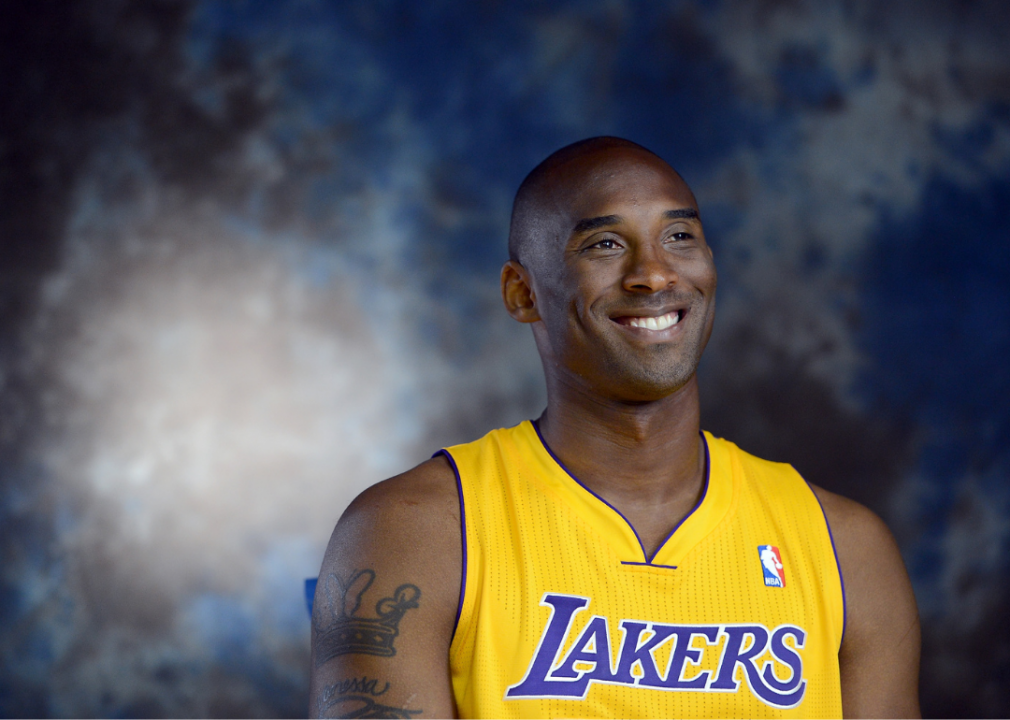
Harry How // Getty Images
Kobe Bryant
Lakers legend Kobe Bryant stood as the first guard nabbed right out of high school, the first player in the NBA with at least 30,000 career points and 6,000 career assists, and is one of four players with 6,000 assists, 6,000 rebounds, and 25,000 points. Bryant, who died in a helicopter accident in 2020, is widely considered to have been one of the greatest basketball players in history not just for his skill, but for his loyalty to his team and mentorship for his fellow teammates.
